#Elections without OBC reservation
Text
शिंदे-फडणवीस सरकारला ‘सर्वोच्च’ झटका; नगरपरिषद, नगरपंचायती निवडणुकीत ओबीसी आरक्षण नाही!
शिंदे-फडणवीस सरकारला ‘सर्वोच्च’ झटका; नगरपरिषद, नगरपंचायती निवडणुकीत ओबीसी आरक्षण नाही!
नवी दिल्ली : इतर मागासवर्गीय (ओबीसी) आरक्षणास मंजुरी देण्याआधी जाहीर झालेल्या ३६५ जागांवरील निवडणुका या ओबीसी आरक्षणाशिवाय (Elections without OBC reservation) होणार असल्याचे सर्वोच्च न्यायालयाने आज स्पष्ट करत, राज्यातील मुख्यमंत्री एकनाथ शिंदे सरकारला जोरदार झटका दिला आहे. त्यामुळे नगरपरिषदांच्या निवडणुका ओबीसी आरक्षणासह करण्याचा शिंदे-फडणवीस सरकारचा प्रयत्न अयशस्वी ठरला असून, त्यामुळे आता ज्या…
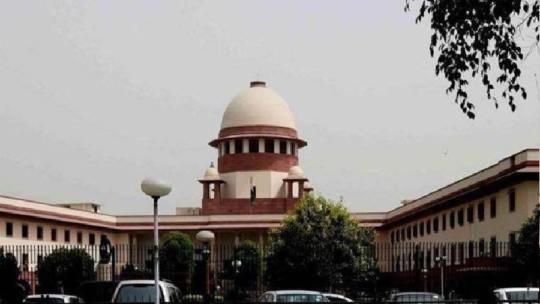
View On WordPress
0 notes
Text
DSSSB TGT English Eligibility Criteria: Know Educational Qualification, Age Limit
The Delhi Subordinate Services Selection board recruits eligible candidates for various posts like the TGT and PGT for various subjects. Candidates willing to flourish their career in the teaching profession can apply for these positions as per their eligibility. Here we will discuss in detail about the DSSSB TGT English Eligibility Criteria. The DSSSB TGT eligibility criteria for English includes educational qualification, age limit, age relaxation, nationality and other criteria.

Only Indian citizens are eligible to apply for this position.
Interested candidates must not be more than 30 years of age to be eligible for this post.
Without satisfying all the essential DSSSB TGT eligibility criteria for English, a candidate's application will not be considered.
DSSSB TGT English Eligibility Overview
Particular
Details
Age
Not more than 30 years
Educational Qualification
BA in English or BA with English as elective
Knowledge of Hindi
Should have passed CTET
Nationality
India
Number of Attempts
No limit until attaining the upper age limit
Experience
No experience required
Important Points
The educational qualification must be attained on or before the last date of application
DSSSB TGT English Eligibility Criteria
To be considered for the Trained Graduate Teacher (TGT) English position in the Delhi Subordinate Services Selection Board (DSSSB), candidates must meet the essential eligibility criteria set by the board. Failure to do so will result in the rejection of their application. Therefore, it is essential for aspiring candidates to understand the prerequisites for this role.
The eligibility criteria for the TGT English position in DSSSB include educational qualification, age limit, age relaxation, nationality, work experience, and the number of attempts. It is important for candidates to fulfil all of these criteria to be considered for the role. We have discussed each of the DSSSB TGT English Eligibility criteria in detail in the sections below.
DSSSB TGT English Eligibility - Educational Qualification
The educational qualification is one of the basic eligibility criteria for any examination. Candidates must possess the essential knowledge about the English language. Along with that, knowledge of Hindi language is mandatory. The criteria are enlisted below in the table.
Subject
Educational Qualification
TGT English (Male)
BA (Honours) in English or BA with English as one of the elective subjects or equivalent oriental degree in English from a recognized University having 45% aggregate marks.
Degree/Diploma in teaching
Knowledge of Hindi is essential
Should have passed CTET from CBSE
TGT English (Female)
BA (Honours) in English or BA with English as one of the elective subjects or equivalent oriental degree in English from a recognized University having 45% aggregate marks.
Degree/Diploma in teaching
Knowledge of Hindi is essential
Should have passed CTET from CBSE
DSSSB TGT English Eligibility - Age Limit
Let us look at the age limit for the position of DSSSB TGT English. Interested candidates must not be more than 30 years of age on the last date of application or on a specified date as mentioned in the advertisement. Any candidate more than 30 years of age will not be considered for this position.
DSSSB TGT English Eligibility- Age Relaxation
Candidates applying under the reserved category are eligible for availing the age relaxation. The details of the age relaxation are given below for each reserved category. Candidates must remember that they must possess the necessary documents to seek age relaxation.
Sr. No.
Category
Age Relaxation
1
SC/ST
5 Years
2
OBC
3 Years
3
PwD
10 Years
4
PwD + SC/ST
15 Years
5
PwD + OBC
13 Years
6
Departmental candidate with at least three years continuous service.
5 Years
7
Ex-servicemen
Period of military service plus 3 years
DSSSB TGT English Eligibility: Nationality
The Delhi Subordinate Services Selection board allows only Indian citizens to apply for the DSSSB TGT English Exam. Any person who is not of Indian nationality, will not be eligible for this position. Their application will not be considered at any cost.
DSSSB TGT English Eligibility: Number of Attempts
There is no limit on the number of attempts for DSSSB TGT English. A candidate can appear for the examination as many times as he or she wishes to until he or she attains the upper age limit i.e. 30 (and more, as per age relaxation). Once they attain the upper age limit, they will no longer be eligible for the position.
DSSSB TGT English Eligibility: Work Experience
Candidates do not need to have any prior experience for applying for the position of DSSSB TGT English. Anyone who satisfies the above mentioned eligibility criteria for TGT English in DSSSB with no work experience can apply for this position.
DSSSB TGT English Eligibility: Important Points
Let us look at some of the important points regarding the DSSSB TGT Eligibility Criteria for English-
Candidates seeking age relaxation under their reserved category must produce the necessary documents as and when required.
Interested candidates must fulfil all the essential eligibility criteria for the DSSSB TGT English. Only candidates who satisfy the eligibility will receive the DSSSB TGT admit card.
Candidates must possess a degree and other certificates that were issued before the application dates.
We hope that candidates now have a detailed idea regarding the DSSSB TGT English eligibility criteria. They can apply for the following position if they satisfy all the essential criteria.
0 notes
Text
Social Justice Warrior: Thanthai Periyar’s Struggle for All-India OBC, SC, and ST Reservation in Education | History behind Social Justice Day — Rational Sapien.
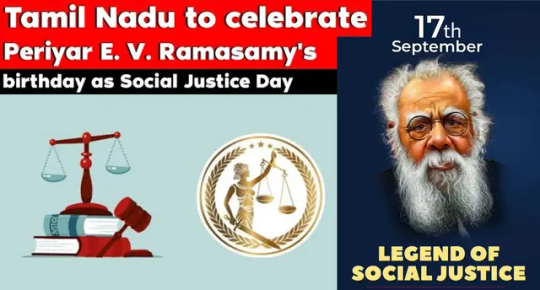
Thanthai Periyar, also known as E. V. Ramasamy, was born to a wealthy merchant in Erode and lived in opulence. In his early days, he was attached to the Indian National Congress and the Khadi movement. He carried Khadi clothes on the streets and sold them, and moved his family to a simpler life.
As a nationalistic Congress leader, Periyar carried bundles of Khadi clothes on his shoulders with the hope of bringing social justice alive. He focused on passing a bill on “Communal Representation” to ensure fair representation for non-Brahmins in government and other institutions. He carried copies of the bill in his hands for five consecutive Congress conferences.
However, due to the heavy Brahmin dominance in the party, his bill was not passed. Instead, the Brahmins twisted his “Community based Representation Bill” as a form of “Divisive communalism”. Periyar realized that the Congress movement was the “fort of Brahminical supremacists.”
Periyar was a powerful and wealthy man, but he gave up everything to fight for social justice. He resigned from his 26 positions, including that of Erode City Council president, to join the Congress party. Later, when he realized that the Congress was not committed to social justice, he left the party in 1925. He said, “If the nation was liberated without social justice, it would only benefit the dominant caste (Brahmins).”
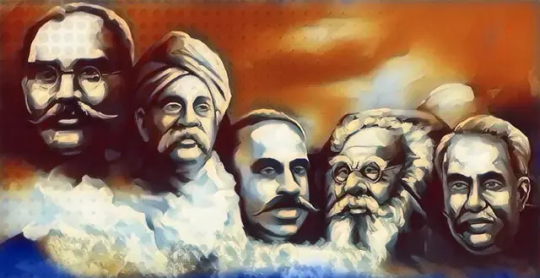
Rettaimalai Srinivasan (left), Justice Party leaders - P. Theyagarayar & Dr. T.M Nair, Periyar ( DK @ Dravidar kazhagam), Arignar Anna ( Dravidar Munnetra Kahzagam @ DMK)
During British rule in the 19th century, Brahmins dominated all fields. The fight for caste-based reservation has a long history, starting with Ayothidasa Pandithar’s call for non-Brahmins to have the right to employment in 1891, and continuing with the Justice Party in 1916.
The Justice Party pioneered social justice in South India by implementing reservation for non-Brahmin communities in 1916. This paved the way for inclusive growth. Brahmins claimed that giving equal representation to all communities was “divisive communalism” to maintain their own power and privilege.
The Justice Party came to power with the support of the people and the Council of Ministers led by King Panagal presented the bill in the Legislative Assembly in August 1921. This draft law was notified as a Government Ordinance Communal G.O 613 (16.9.1921) and a committee consisting of legislators was constituted to monitor the proper implementation of the Ordinance.
After this, on August 15, 1922, an ordinance was promulgated to provide class representation in educational institutions, but this ordinance was stalled due to the conspiracy of the Brahmins. The fact that what happened on that day was the lack of support from the governor and the white ICS officials. Hindu, Sudeshamitra etc. Brahmins wrote strongly against it.
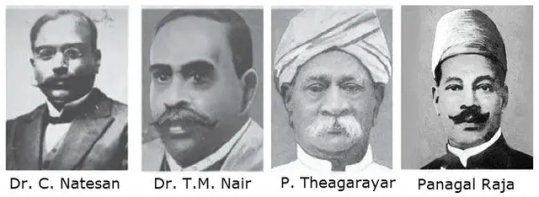
Justice Party Leaders
The Justice Party lost the third election in 1926. There was a dispute among the majority Swarajya Party over who would be the Chief Minister. Therefore, the Swarajya Party brought P. Subbarayan from the Justice Party and asked him to form an independent cabinet so that the Justice Party should not form the cabinet. Similarly, he formed a cabinet with himself as the Chief Minister and Swarajya Party member A. Ranganatha Mudaliar and RN Arokiasamy Mudaliar as ministers and took over the government on 4.12.1926. The Swarajya Party dreamed of winning Subbarayan away from the Justice Party and bringing it to their side. However, he also led the government after listening to the Justice Panagal, who was the leader of the opposition party. Therefore, his regime is considered as a Justice Party regime.
Suppurayan, a former Justice Party member, was supported by both the Swarajya Party and the Congress Party, but Suppurayan took office as Chief Minister in August 1927 when he moved a motion of no confidence in the Subpurayan cabinet, which was defeated with the support of 14 members of the Justice Party.
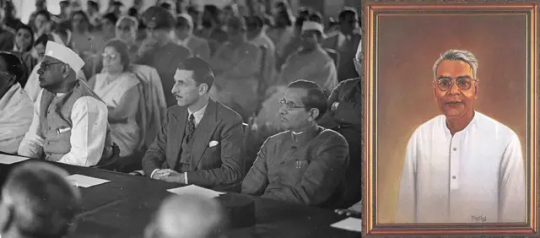
Paramasivam Suppurayan, a former Justice Party member successfully implemented Communal G.O with the help of Justice Party in 1928.
S. Muttiah Mudaliar left the Congress party opposing the Congress’s pro-brahmin activites and join the Suppurayan cabinet. He was the first to introduce the new Caste Reservation Act in the Madras Provincial Assembly on 04.11.1927. The Suppurayan Cabinet issued a new order for caste reservation in 1927 (G.O. M.S. No 1021).
On January 28, 1928, Subparayan did not accept the resolution passed by the Swarajya Party in the Legislative Assembly to ignore the Simon Commission. So two ministers belonging to the Swarajya Party resigned and therefore got the support of the Justice Party Suppurayan became Ministers in his cabinet S. Muthiah Mudaliar and MR Sethuratnam Iyer. Justice Party and Self-Respect Movement as their commander Soundarapandian came to the Suppurayan cabinet as the whip of the ruling party. Soundarapandian built this cabinet like a fortress.
This cabinet came into charge on 16 March 1928. This cabinet is also considered as the Justice Party cabinet.
This Cabinet passed Communal Ordinance №744, dated 13.9.1928. This order issued by S. Muthiah Mudaliar for the first time defined this number of places for all the communities. Yes, S. Muthiah Mudaliar, a non-Brahmin, issued this “Community based Reservation for all Government jobs” in 1928 providing 100% reservation for the entire population, including Brahmins, non-Brahmins, and minorities.

Community Based Reservation implemented by Suppurayan Devised by Justice Party in 1926.
After the implementation, Periyar pointed out some of the issues in the Communal Go G.O. M.S. No 1021.
Minister S. Muthiah Mudaliar brought this Communal Ordinance for the Registration Department he was holding. But, Periyar wrote in the “Kudiarasu” that communal representation should be implemented in all sectors. Accepting Periyar’s order, the Subbarayan cabinet issued this order in other departments as well. By these orders, non-Brahmins got reservation in government jobs. Thus Periyar enriched communal representation. Periyar praised this as “long live Muthiya Mudaliyar!” in Kudiarasu Editorial Magazine.
Periyar’s campaign progressed by demolishing the Brahminical structure by exposing the Brahmins’ conspiracy in his editorials and articles in the Kudi Arasu newspaper. Thanthai Periyar used his power and authority in the Madras province to educate all non-Brahmin communities about the true purpose of community-based reservation.
People who say that Periyar wasn’t important for social justice don’t understand how he changed people’s minds.
Periyar started the Self-Respect Movement in 1925, the same year as the Indian National Congress. He worked hard to expose the harmful structures of these systems to the people.He played a big role in social justice because of the ways he showed people how caste, religion, piety, superstitions, misogyny, ritualism, and formalism were harmful and kept people from respecting themselves.
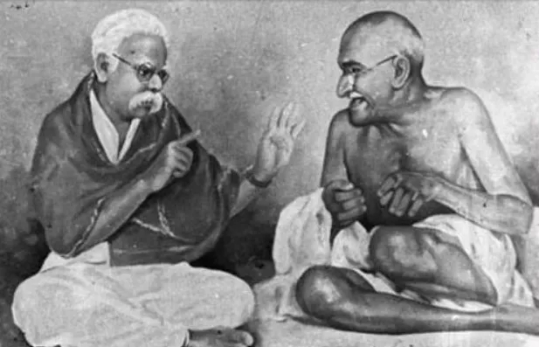
Periyar Left congress & Started Self Respect movement in 1925.
Periyar didn’t just go to public meetings but also to caste groups meetings. He spoke at caste conferences. Talking to caste groups is like handling a double edged knife But Periyar handled it tactfully. Periyar made miracles by changing the caste mindset into an egalitarian mindset and asking for the rights due to their caste.
Beginning in 1925, he addressed more than ten caste conferences covering the majority of the population. In particular, the conferences of castes like Nadar, Sengundar, Vanniya Kula Chatriyas, Chettiars, Pallars and Adi Dravidians are included in it.”
A caste conference should be convened to take the shortcomings of each caste to the government. If you call me to caste conferences, I will talk about everything and Caste annihilation. He was the one who said that the cruelty of one being superior and one being inferior taught by the Varnashrama Dharma should be eradicated.
He also expressed the shame of having caste Pride. At the same time, he also spoke for rights that were denied in the name of caste. He brought egalitarianism and social justice rights so subtly in the People’s Forum.
After India’s independence, Periyar held caste abolition conferences in a political environment where people developed caste pride out of greed for position and power. Periyar always talked about social justice rights at all conferences, no matter whether they were caste Group conferences or caste abolition conferences.
The Justice Party was able to bring about social change by implementing community-based reservation under British rule through dual rule system. Even after Justice Party, this system of reservation continued till 1950.
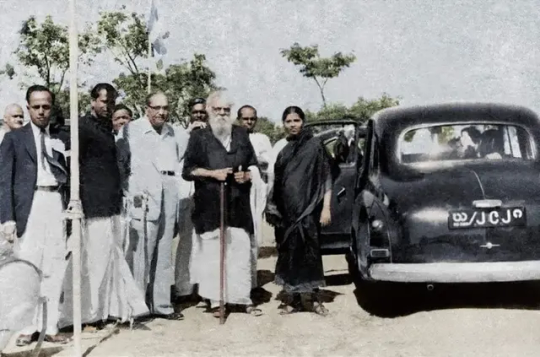
Babasaheb Ambedkar & Thanthai Periyar E V Ramasamy
The Constitution enacted on January 26, 1950, by the intellectual revolutionary Ambedkar, provided for reservation in employment only, but there was no reservation in education. After Independence, Brahminism made its first major attack on social justice brought by Justice party.
It was then that the greed of the brahmins made them gobble up the reservation reserved for the brahmins themselves. Sembagam Durairajan and Srinivasan case played a major role in that. They said “Both of them didn’t get seats in medical college and engineering college respectively”. They filed a case in the Madras court claiming that this was against the fundamental provisions of the Constitution.
After hearing the case of these two, the court found that “Sembagam Durairajan did not apply to the medical college and Srinivasan falsely reported that he did not get a seat even after 14.29% of the reserved engineering seats for Brahmins were filled.” Through their Greediness, the wish of the Brahmins was fulfilled. On 27.07.1950, The Madras High Court struck down the Madras Province’s “Community-based Reservation Rights Act in Education and Employment” Act, which was in implementation from 1924 to 1950, as unconstitutional. The Supreme Court also gave the same verdict.
How will Periyar, as a man who threw away his prosperous life and positions in Congress fighting for the right of social justice for all oppressed castes, accept this verdict?.
14th August in 1950, Periyar launched agitation and gave the clarion call to the people of Tamil Nadu to express protest by declaring “Communal Reservation Day”. The protest was against the judgment given by Supreme Court of India that stayed the Communal Reservation Policy implemented in Madras Presidency right from 1928. On 07.08.1950 at Robinson Park, Chennai, 50,000 people attended the meeting and Periyar invited people from all walks of life to fight.
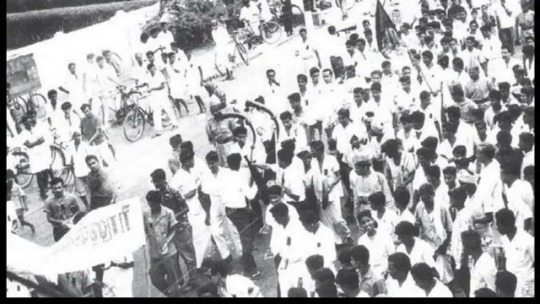
Chennai Pachaiyappa’s College Students joined the protest with Periyar.
On 14th August (1950), Accepting Periyar’s invitation, various students staged a protest. Students of Chennai Pachaiyappa’s College protested against the court order. Periyar’s Call ignited Total agitation in Tamil Nadu in all sectors and all sections of people including students, teachers, doctors, govt. servants, all non-brahmins joined the struggle.
The slogans of “Abolish the political law, want communal rights” chanted by the entire gathering echoed up to the Delhi Union government.
On December 3, 1950, in Trichy, Periyar gathered all-party communal rights supporters including Perarignar Anna (DMK), Kamarajar, and convened a communal conference at Periyar House. He conducted a conference and said, “You have given four water pipes with taps to the streets; but you have not given the water supply to that tank! We have been given reservation for employment, but we have not studied yet. Then, how can we go for job opportunities?”. Periyar passed the Communal G.O.
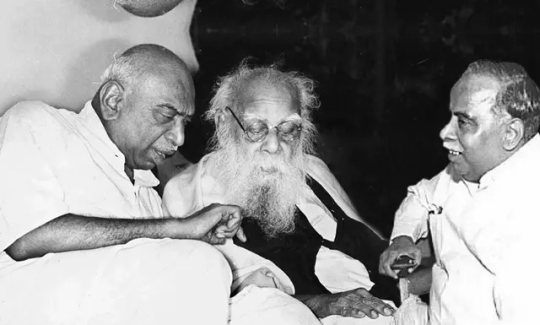
Kamarajar (Left), Thanthai Periyar (center), Perarignar Anna (right).
Tamil Nadu registered its protest that students are protesting and shutting down shops everywhere in Tamil Nadu. They protested by showing black flag to Union Ministers. On the other hand, Kamaraj and Sardar Vallabhbhai Patel conveyed the Seriousness & strength of Periyar’s Protest to the the Prime Minister of the India, Jawaharlal Nehru. Ambedkar also registered his opposition.
Periyar’s voice spread not only to the ears of the Delhi Union government but also to the people about the necessity of reservation in education. Periyar’s agitation forced the Nehru government to come down on education reservation.
The first amendment was tabled in Parliament by Chief Minister Pandit Jawaharlal Nehru on 10.05.1951. Including Education reservation, a total of 14 amendments were made in the Constitution through a single proposal. Nehru mentioned this in his introductory speech on the amendment. “Protests in Madras province lead us to amend the law”. Parliament passed it on 18.05.1951 with an overwhelming majority and made it law.
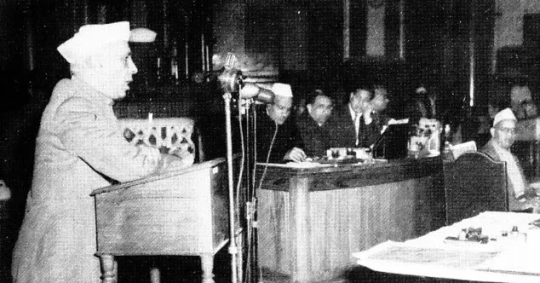
First Constitutional amendment by Chief minister of India, Pandit Jawaharlal Nehru.
In order to overcome the verdict in the Champakam Durai Rajan case, the Parliament brought in the First Amendment Act, 1951 and inserted clause 4 to Article 15. The provisions of this clause are in the nature of an enabling provision (allows, felicitate) and do not impose any obligation on the State to take any special action under it. It merely confers discretion to act if necessary by way of making special provisions for socially and educationally backward class and Scheduled Castes and Scheduled Tribes.
Article 15(4) : “neither clause of this Article 15 nor Clause 2 of Article 29 shall prohibit the State from making any special provision for the advancement of any citizen of socially and educationally backward classes or of Scheduled Castes and Tribes”
Until then, Article 16(4) ensured reservation only in case of employment. Reservation in education came only after the First Amendment, which ensured reservation for backward, scheduled, and minority communities across the country by the Union and State Governments. Through the efforts of Periyar and the DMK, the addition of Section 15(4) to the Indian Constitution paved the way for the Mandal Commission protests by periyarists and the implementation of all-India OBC reservation in education by V.P. Singh.
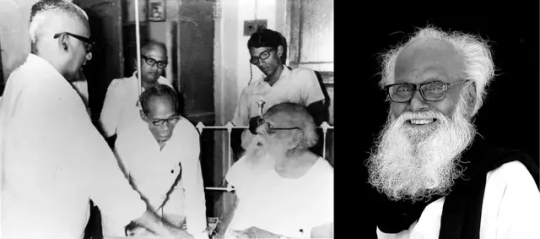
V Anaimuthu (centre) receives permission from Periyar to publish his thoughts.
When Periyar passed away in 1973, Anaimuthu, A periyarist, continued the struggle for social justice of backward classes. Anaimuthu parted ways with the D.K and formed the Periyar Sama Urimai Kazhagam (Periyar Equal Rights Kazhagam) which took up reservation as their main agenda. Between 1976 and 1982, Anaimuthu conducted his campaign for reservation in education and employment in the Central government. In Bihar, their volunteers filled the prison as part of this demand. He took the struggle to New Delhi. The Mandal Commission was formed because of these pressures.
Anaimuthu made sure the Mandal Report was released in Parliament in 1980, thanks to which 50 per cent reservation for the Backward Classes was passed. But it was not implemented as promised, hence he began to meet Members of Parliament from 1981 onwards. In 1990, the then Prime Minister V P Singh announced in the Parliament that the recommendations of the Mandal Commission would be implemented Which provides 27% reservation for OBC’s on top of 23% reservation for SC and ST in India.
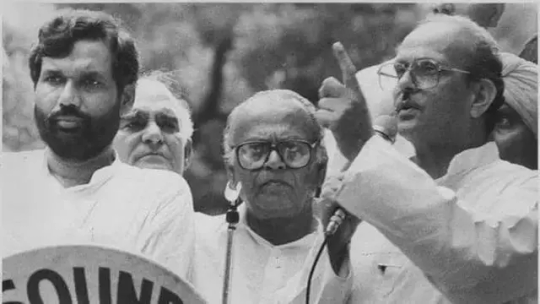
Former Prime Minister V.P. Singh addressing a rally about implementation of the Mandal Commission Report in August 1990
Indira Sawney challenged the Mandal Commission and government decision to implement the OBC Reservation by V.P.Singh in the Supreme Court. In 1992, All India OBC reservation was implemented after Indira Sawney case was Closed with a provision that maximum reservation can be 50% of the educational seats or job vacancies and creamy layer of income of ₹8 lakhs per year. Anaimuthu’s untiring effort to implement the Mandal Commission report in this decade is a milestone in Indian history.
There are so many leaders who have made the government realize the right of social justice. But Periyar was the foremost among the leaders who spread the importance of Social Justice through reservation to the people and even today his followers ensure the
Periyar was a tireless advocate for the rights of the oppressed and backward people in the People’s Forum, touring all the nooks and corners of Tamil Nadu to the extent that he gave up his elite life. People say, “There was no place in Tamil Nadu where Periyar did not set his feet.” Periyar was an uncompromising opponent of the Brahminical intrigue against social justice reservation in the political arena. Social justice is the tool that Periyar used in his political arms to pave those paths against Brahminical intrigue and restore the social rights of the Tamil Nadu. Calling the social justice hero Thanthai Periyar’s birthday as Social Justice Day is a small thank-you to him for his lifelong struggles for the majority oppressed castes.
“One comes to school for training to acquire merit and skill. But if you need a qualification and skill even to study and get training, this is foolishness,” said Periyar. The ruling union government is keeping the meritorious children of our children by imposing merit tests like NEET to protect the power structures of Brahminism. Let us stand on the path of Periyar, who stood for social justice, and take a pledge to eliminate the anti-social justice selection criteria on this Social Justice Day.
#Periyar#Dravidian#Education Reservation#All India OBC SC ST Reservation#E V Ramasamy#First Constitutional Amendment#Indian Educational Reservation#Dalit Rights#Babasaheb Ambedkar
1 note
·
View note
Text
South Will Not Suffer Over Delimitation, Sources Say Amid Population Concern
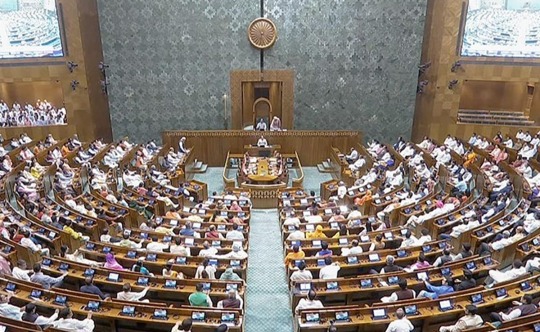
New Delhi: The government will be considerate of the fact the southern states have successfully managed to control their population and so should not suffer during delimitation, top sources indicated today amid a bitter battle in parliament over the women's reservation bill.Fears of southern parties that South India will be penalised for early population policies by an impact on their seats, will be allayed, sources told NDTV. The huge population in the north ensures that they will get more seats and there are concerns that the south will be under-represented.The government understands that concern and will do the needful, sources said.The government is trying to push through the bill -- meant to reserve 33 per cent seats for women in the Lok Sabha and state assemblies -- in the ongoing special session of Parliament.But the reservation can only be implemented after a census and delimitation exercise.After next year's election, a Delimitation Commission will be formed. It will be a democratic exercise with representatives from all parties, sources said. The census will be carried out alongside. Even so, the implementation of the women's quota can begin only after 2029.Under Article 82 of the Constitution, only the Census data after 2026 can be used for the delimitation exercise. There is no clarity yet on how the government plans to cross that hurdle.The last delimitation exercise took 18 months, had over 211 meetings with public hearings in every state.In the seven-hour debate in the new parliament today, the opposition parties demanded that the bill be implemented without any delay.Opening the debate, Sonia Gandhi underscored that the initiative for the bill was taken under the UPA government."How many years will they (women) have to wait... two... four... eight? Is this right? Congress demands the bill be implemented immediately," she said, calling for reservation for women from SC, ST and OBC communities. Delaying this would be gross injustice to women," she added.The 2010 bill was passed in the Rajya Sabha but could not be presented in Lok Sabha following opposition from Samajwadi Party and the Rashtriya Janata Dal -- a point that has provided ammunition to the BJP.
Read the full article
0 notes
Text
Supreme Court’s decision on OBC reservation for the UP ULB elections
On January 4, 2023, the Supreme Court of India stayed the Allahabad High Court's decision regarding the involvement of OBC (Other Backward Class) in the upcoming Urban Local Body (ULB) elections. This decision was made after filing a Special Leave Petition by the State Government in the Apex Court. On December 29, 2022, the UP Government moved to the top court after hearing from Chief Minister Yogi Adityanath.
The bench comprising Chief Justice DY Chandrachud and Justice PS Narasimha passed the order in a petition filed by the Government of Uttar Pradesh challenging the decision of the Allahabad High Court on OBC reservation in ULB elections. Earlier on December 27, 2022, the state administration holds the elections for ULB without OBC reservation as directed by the Allahabad High Court.
visit here for more supreme court updates
The impugned judgment of the High Court determined that “It is further directed that until the triple test/ conditions as mandated by the Apex Court in K. Krishna Murthy and Vikas Kishanrao Gawali is completed in all respects by the State Government, no reservation for the backward class of citizens shall be provided.” Further directing to conduct ULB elections without including reservation for OBC.
While hearing Vaibhav Pandey vs. the State of Uttar Pradesh, the Supreme Court stayed the order of Allahabad HC. The CJI stated that the State Government would issue delegation and financial powers and ensure that the administration of local bodies would not be hampered. A five-member commission was formed by the administration for providing OBC reservations in ULB elections. Moreover, the Solicitor General mentioned that the tenure for the newly appointed commission was six months and ensure that an appropriate process would be followed to complete the exercise before March 31, 2023. In addition, the Supreme Court also highlighted that “The notification to be issued for elections shall include the reservation for women in terms of the constitutional provisions.”
0 notes
Text
Big Setback For Yogi Adityanath Government Ahead Of Local Elections
Big Setback For Yogi Adityanath Government Ahead Of Local Elections
According to a draft, four mayoral seats were reserved for OBC candidates. (File)
Lucknow:
The Lucknow bench of Allahabad High Court on Tuesday scrapped the state government’s draft notification on urban local body elections and ordered holding the polls without reservation for the OBCs. The verdict was passed by a division bench of Justice DK Upadhyay and Justice Saurav Lavania.
A division…
View On WordPress
0 notes
Text
ओबीसी आरक्षणाशिवाय 92 नगर परिषदेच्या निवडणूका ; सर्वोच्च न्यायालयाचे निर्देश. https://beed24.in/92-municipal-council-elections-without-obc-reservation-supreme-court-directive/
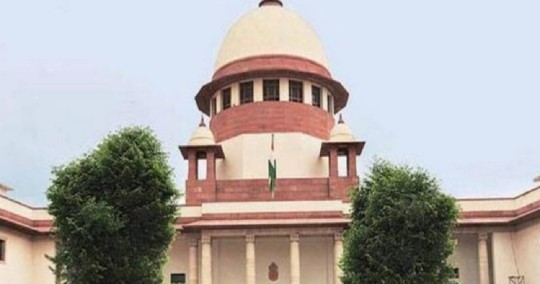
0 notes
Note
not u bitching and moaning abt reservations,,,, girlie check ur privilege and i say this as a general category neet aspirant giving exam in 2022
General category with half a year to go with only 35% seats left within the already saturated medical profession and the cut throat competition?
Must have a pretty good prep if you have time to go through my blog and send me asks.
Tell me how the exam goes ✌️ (i ll open asks next yr for u to bitch again ;)
[ alright so people have been getting the idea that i somewhat believe that caste discrimination doesnt exist ? It does it fucking does but reservation now is just a vote bank for govt and the poor people dont even get most of its benefits.
And since you obviously dont own a single brain cell let me explain (u sure u can pass neet without quota ? Good luck uwu)
IN my post i perfectly said that I believe different measures should be there and enlisted some alteratives. I only critised the use of reservations as a political agenda and pointed out how it was ironic that this obc reservations were passed just before elections and how the reservations are more than 50% which is condemned by the supreme court. ]
#asks#anon#istg i am switching of this option#also i did tell you that was my opinion and i never said that i am not privileged#just said that reservations wasnt the right way to do it
13 notes
·
View notes
Text
"RESERVATION SYSTEM" – A DISEASE OR REMEDY TO DISEASED SOCIETY ?
WE ARE LIVING IN A SOCIETY THAT PROMISE AND EVEN RUN ON IDEOLOGY THAT EVERY SINGLE PERSON OF THIS COUNTRY IS EQUAL AND WE ALL SHARE A COMMON GENETIC MATERIAL AT AN EXTENT OF MORE THAN 99%
BUT WHAT IF U COME TO KNOW THAT THESE IDEALS DO NOT WORK IN THE REAL WORLD!
I AM 100 PRCNT FOR SURE THAT YOU WILL AGREE WITH MY POINT.
I M LIVING IN A COUNTRY WHICH IS At AN EXTENT OF REACHING POPULATION mark OF ABOUT 150 CRORES IN NOT MORE THAN A DECADE AS FAR AS ITS POPULATION GROWTH IS CONCERNED
GOING BACK IN HISTORY "MANDAL COMMISSION"
ARTICLE 15 AND 16 EMPOWERED CERTAIN GROUP OF PEOPLE WHO WERE BACKWARD AND NEEDED EMPOWERMENT TO BRING A BALANCE IN SOCIETY(BASED ON THE PRINCIPLE THAT VEHICLE CAN BE RUN ONLY WHEN ALL ITS WHEELS ARE WORKING OK OK!)
NO DOUBT THAT WAS A BRILLIANT STEP TAKEN BY "BUDDHIJIWI" OF INDIAN SOCIETY
PEOPLE WHO WERE AWARDED THESE POLICIES NEEDED THEM BADLY TO GROW AND ACHIEVE THAT SOCIAL STATUS AND BECOME EQUAL TO THOSE PEOPLE WHO TREAT THEM UNTOUCHABLES
SO SOCIETY SPLITEED UNDER 4 CATEGORIES ST, SC, OBC, AND GENERALS
people grew SERVING THESE POLICIES AT A VERY REMARKABLE RATE
BUT WHAT OUR BUDDHIJIWI MISSED - THEY TARGETED ONLY UNTOUCHABLES
DID THEY WERE SO SURE THAT ALL BRAHMIN'S (GENERAL CATEGORY) SON/DAUGHTER ARE WELL SUFFICIENT THAT THEY WILL FOR SURE EARN THAT MUCH MATCHING PAY SCALE NEED TO SURVIVE WITH THEIR BASIC NEEDS?
WERE THEY TOO SURE THAT THE PEOPLE THEY ARE EMPOWERING WILL NOT TURN TO BE ON REVENGE MODE FOR WHAT TREATMENT WAS GIVEN TO THEIR FOR-FATHERS?
DID THEY guaranteed THAT THEIR POLICIES WILL BE BENEFICIAL TO EVERY BACKWARD PERSON LIVING IN REMOTE AREA WHO DID NOT HAVE FACILITY OF BASIC NEEDS available to URBAN SOCIETY(I M TALKING ABOUT ELECTRICITY AND INTERNET) TILL THIS DATE?
DID THEY EVER mention THAT WHAT IF THEIR9 POLICY IS A SUCCESS, WHAT MEASURE WILL THEY TAKE TO DRAW IT BACK AND ASURRING THERE WILL BE NO AGRESSIVE ACTION BY MINORITIES?
ANSWER TO EVERY QUESTION IS SIMPLY
NO
!!
NOBODY THINK ABOUT IT AND NOBODY WANT TO EVEN DISCUSS IT BECAUSE "VOTE BANK TO INHI SE CHLTA HAI"
IN 2020 WE HAVE (ACC TO STATISTA)
SCHEDULE TRIBES-9%
SCHEDULED CAST(DALITS)-20%
FORWARD CASTE-30%
OTHER BACKWARD CLASS-41%
IN WHICH
22.5% - SC+ST RESERVATION
27% - OBC
10% - EWC
AND REST IS
UNRESERVED!! - MEANS SEATS CAN BE OWNED BY ANY OF THESE ABOVE TOO (50.9% - CAN BE CONSIDERED AS REAL MARK OF TALENT, FOR SOMEONE`S HARD WORKS, DETERMINATION,SACRAFICE,PASSION,ETC)
SO THIS IS REALITY
I M SHARING A STATICS CIRCULATED BY NTA(EXAM CONDUCTING BODY FOR ENGINEERING AND MEDICAL ENTRANCE TEST)
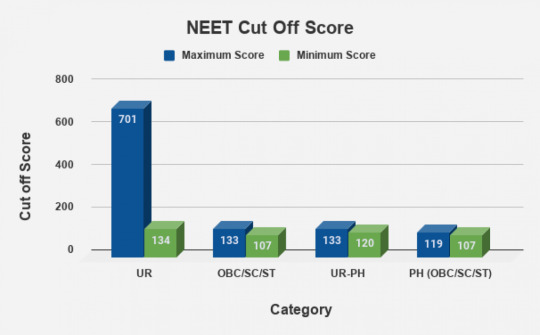
YOU CAN`T SKIP THAT IF YOU HAVE NOT SEEN THAT pls see it for once
found that!!!!
YES THIS IS THE REALITY
(UR)
YOU NEED 600/720 TO TAKE ADMISSION IN GOVT. MEDICAL SCHOOL FOR STUDYING M.B.B.S
(IF YOU ARE CURSED TO HAVE BENEFITS OF UNRESERVED CATEGORY .......LOL!)
BUT IF YOU ARE A CATEGORY STUDENT YOU NEED TO GET AROUND 500/720 (WHAT!!)
YES AND NOBODY WILL EVER ASK YOU THAT HOW MUCH YOUR FATHER EARN, WHICH REPUTED INSTITUTE YOU HAVE TAKEN ADMISSION AFTER GIVING LAKHS OF RUPEES(BUT YOU HAVE BEEN MARKED AS BACKWARD AND THEY WILL GIVE YOU BENIFIT)
(SOUNDS SIMILAR LIKE AN ATHLETE IS GIVEN ADVANTAGE OF COMPLETING A RACE AT 80m and GETTING GOLD MEDAL IN 100M RACE)
YES, WE LIVE IN THIS SOCIETY AND MATTER OF CONCERN WE CAN`T EVEN COMPLAIN BECAUSE "WO LOG DANGA KR DENGE"!!
"YE TO OR BADHANE KI DEMAND KRNE LGTE HAIN!!"(PEOPLE GETTING BENEFITS ARE NOT SATISFIED AND THEY DEMAND MORE PERCENTAGE)
AND ALSO SUPPORTED BY "MURAKH" POLITICIANS OF OUR COUNTRY(BIGGEST MISFORTUNE) AND EVEN DARE TO GO TO SUPREME COURT TO INCREASE THE QUOTA
THANKFULLY NO STATE CAN INCREASE RESERVATION BEYOND 50% IN ALL GOVERNMENT ADMISISSIVE AND WORKING DEPARTMENTS
PEOPLE TALK ABOUT NAZI`S , BLACK LIFE MATTER, ETC BUT HAVE THEY EVEN WROTE OR RAISED THEIR VOICE ON THIS ISUUE
UNFORTUNATELY, I HAVE NOT SEEN ANY PERSON POSTING ANYTHING ON THIS MATTER ON SOCIAL MEDIA PLATFORM
"GHAR ME LGI AAG KO BUJHANE KI FURSAT KISI K PAS NHI H"
THEY LOVE TO POST ABOUT WHAT`S ALL HAPPENING IN WEST(NEVER MIND - THEY MIGHT BE LIVING IN WORLD OF SOCIAL MEDIA)
YES GENERAL CANDIDATE SPEAKS BUT ONLY WHEN THEY GET AFFECTED
NO ONE CAN IMAGINE A PAIN WHEN YOU MISS YOUR SELECTION BY FRACTION OF PERCENTILES AND YOUR COMPETITOR IS ALREADY A WINNER WHILE YOU HAVE SCORED TWICE OF HIS TOTAL SCORE (MAYBE I SOUND LIKE AN IDIOT BUT BELIEVE ME I HAVE SEEN THIS THING IN REALITY)
NO DOUBT PAST WAS VERY BRUTAL BUT MAHATMA GANDHI ONCE SAID
"ANKH KE BADLE ANKH SARI DUNIYA KO ANDHA BNA DEGI"(EYE FOR AN EYE WILL MAKE WHOLE WORLD BLIND)
THERE ARE EVEN CASES IN INDIA WHERE PEOPLE STOPPED USING THEIR SURNAMES BECAUSE of "BABU" IN GOVT. OFFICE WILL NOT LET THEIR(general category) FILES AND DOCUMENT GO FOR FURTHER PROCEDURE
DID THOSE "BUDDHIJIWI" EVER IMAGINED OF THIS SITUATION
?
I CAN GUARANTEE THAT MORE THAN 50% OF TOTAL POPULATION OF CATEGORY(ST/SC) WILL NOT BE ABLE TO UNDERSTAND AND ALSO A LARGE PERCENT OF THAT POPULATION EVEN CAN`T ACCESS MY CONTENT
SO WHERE ARE ITS BENEFITS?
YES WE HAVE SEEN A GOOD DEVELOPMENT IN MINORITY SECTION OF OUR SOCIETY BUT STILL, A LARGE FRACTION IS STILL UNKNOWN OF THESE BENEFITS
"YHA SIRF RAJA KA BETA HI RAJA BAN RHA HAI"
The MAIN IDEA BEHIND THIS SYSTEM IS NOT SUCCESSFUL AND WILL NEVER BE COMPLETED BECAUSE OF FAULTS OF OUR SYSTEM
I'm NOT AGAINST RESERVATION SYSTEM BUT MY MAJOR CONCERNS ARE
1. WHERE IS MY RIGHT OF EQUALITY
2. WHY THERE IS RESERVATION FOR SYSTEM FOR PROMOTION ( EVEN THEY ARE GIVEN JOBS FOR FACT THAT THEY JUST BELONGING TO A MINORITY CATEGORY)
3. WHEN THEY HAVE SCHOLARSHIP SCHEMES FOR STUDENTS THEN WHY DO THEY ARE OFFERED WITH RESERVATION
AND WHEN I TRY TO FIND MY ANSWERS I SIMPLY END AT CONCLUSION THAT THIS IS MY "MISFORTUNE"
I SHOULD NOT BE LIVING IN THIS COUNTRY WHERE PEOPLE ARE NOT JUDGED ON BASIS OF THEIR TALENT BUT BASIS
"ISKA BAAP KON JAT KA HAI"
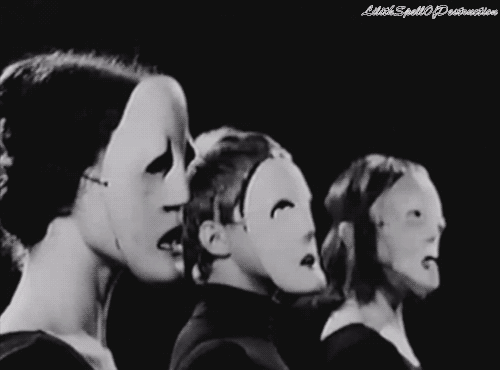
YES, THIS MAY SOUND VERY RUDE ON MY PART BUT THIS IS REALITY !!
AND I CAN ASSURE YOU THESE ARE YOUR WORDS TOO INSIDE BUT YOU ARE VERY USED TO THIS THAT IT RARELY BOTHERS YOU
BUT IT MATTER WHEN YOU APPLY FOR JOBS OR ADMISSIONS
SO WHAT WE CAN DO
1. UNRESERVED CANDIDATE HAVE TO UNDERSTAND THAT THEY HAVE TO STAND FOR THEMSELF AND HAVE TO RAISE THEIR VOICE
2. COMMON PEOPLE SHOULD REALISE THAT ONGOING SITUATION MAY LEAD TO EVEN MORE DRASTIC SITUATION AS MORE POPULATION WILL KEEP ON ADDING
3. RESERVATION FOR PROMOTIONS SHOULD BE REMOVED FOR SURE
4. CANDIDATE WHOSE FATHER/MOTHER IS IN GOVERNMENT SECTOR SHOULD NOT GET BENEFITS OF RESERVATION
5. LIMITING THE CRITERIA OF RESERVATION PERCENTAGE
6. MAINTAINING THE CRITERIA FOR TRANSGENDERS AND P.H (YES! THEY ALSO HAVE RIGHT TO STAND EQUALLY IN SOCIETY)
7. SCHOLARSHIP SCHEMES FOR STUDENTS( ON BASIS OF THEIR ECONOMIC STATUS NOT ON BASIS OF CASTE SYSTEM
8. NO ELECTORAL CANDIDATE CAN USE "JAATI" AS A TOPIC FOR COMPETING ELECTION
AND IT SHOULD BE MONITERED AND STRICT PUNISHMENTS IF FOUND GUILTY
9. SPECIAL SCHOLARSHIP SCHEMES FOR EMERGING STUDENTS OF ST/SC/ OBC CANDIDATES
10. IMPROVEMENT OF QUALITY OF EDUCATION IN GOVT. SCHOOLS WITH PROPER MONITORING OF TEACHERS ADMITTED TO SCHOOL
11. COMPULSION OF GOVT. EMPLOYEES TO SEND THEIR CHILD TO NEARBY GOVT. SCHOOL FOR AT LEAST TERM OF 12 YEARS(THIS WILL IMPROVE THE QUALITY OF EDUCATION AUTOMATICALLY.😂..............LOL!!)
THE RESERVATION SYSTEM INSTEAD, BE FOCUSED ON ECONOMIC BACKWARDNESS IN PLACE OF SOCIAL BACKWARDNESS
CONCLUDING MY BLOG I WOULD LIKE TO SAY
"AGR CHEZIEN FREE ME BANT DI JYE TO VALUE KM HO JATI HAI ISLIYE LOGO KO MEHNAT SE CHEZIEN KMANE K OR MAUKE DENE ME HI SAMJHDARI HAI"
AND YES INDIA DON'T NEED RESERVATION SYSTEM FOR "MENTALLY HANDICAPED" PEOPLE
Many ST/SC CANDIDATE HAVE SERVED THIS NATION WITHOUT USING THAT TAG AND WE ARE VERY PROUD OF THEM BECAUSE OF THEIR POTENTIAL,HARDWORK AND STRUGGLE.WE ALL ARE INDIANS AND WE ALL HAVE GOOD QUALITY OF BRAIN(NO DOUBT)
If this system is not iradicated from our society then we must be prepared for UPCOMING CIVIL WAR in this country because 60% population of this country is youth and no body could even imagine the enormous amount of anger they carry with them against this SYSTEM when they face a type of injustice

JAI HIND, JAI BHARAT
#reservationFreeIndia#rightofequality#ankhekholosarkar#इंडिया#india#आरक्षणमुक्तभारत#Generallifematters#politics
1 note
·
View note
Text
Indore Municipal Corporation elections; 1,835,316 voters to elect 85 corporations, mayor
Indore Municipal Corporation elections; 1,835,316 voters to elect 85 corporations, mayor
Indore Municipal Corporation elections; 1,835,316 voters to elect 85 corporations, mayor
Indore (Madhya Pradesh): Following the verdict of the Supreme Court to conduct the elections of local bodies without OBC reservation, now, the District Election Office has also planned to conduct the elections to Indore Municipal Corporation by making publication of the final voters’ list. There are…
View On WordPress
0 notes
Text
Recall OBC quota order or defer MP local polls: Centre in SC | India News
Recall OBC quota order or defer MP local polls: Centre in SC | India News
NEW DELHI: The Centre on Sunday moved the Supreme Court seeking recall of its December 17 order de-reserving seats for Other Backward Classes (OBCs) in MP panchayat polls while asserting that holding elections without ensuring adequate representation of the community in elected bodies in grassroots-level governance was contrary to the mandate of the Constitution. Alternatively, the SC could defer…

View On WordPress
0 notes
Text
Coal India owes huge money to Jharkhand, can stop company's operations: CM Hemant Soren | India News
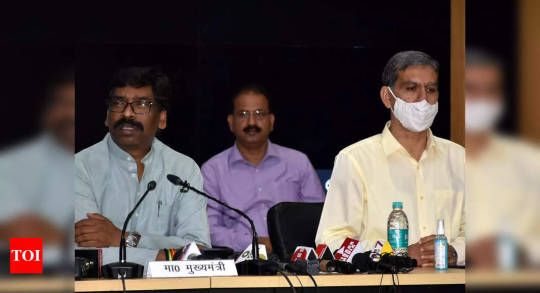
RANCHI: Chief minister Hemant Soren on Thursday said if the opposition BJP supports him, he can stop functioning of Coal India Limited (CIL), which owes Rs 1.5 lakh crore to the Jharkhand government in the state.
Despite that, the Centre is auto-debiting huge funds from Jharkhand's RBI account, Soren said in the assembly and attacked the central government for its alleged partisan approach towards non-BJP-ruled states.
"If the main opposition party (BJP) supports, I can make a decision to stop the work of Coal India. It owes Rs 1.5 lakh crore to the state.
"When we raise the issue, some central minister comes and the CIL pays Rs 50 crore or Rs 100 crore. So far, only Rs 300 crore has been received," the chief minister said during the last day of the Monsoon session of the assembly.
However, he said he does not want to make such a decision that will affect the Central government and leave other states without power.
Soren alleged that the Centre is not giving the state its due but is deducting thousands of crores of rupees from its account.
Earlier, BJP legislator Dhullu Mahto asked a question related to compensation to people displaced due to CIL projects in Dhanbad region to which Soren said the PSU was not heeding to requests of the state government.
In July, Soren had asked the CIL to immediately pay Rs 56,000 crore outstanding dues in lieu of government land allotted to it for mining.
Attacking the BJP, Soren said the party has failed to digest defeat in polls in Jharkhand as well as in neighbouring West Bengal.
"During the election in West Bengal, it appeared that it was a war between India and Pakistan. One should accept defeat. The opposition too has its role. We also spent five years in opposition," Soren said.
The BJP-led central government is deducting money from the consolidated account in the name of Damodar Valley Corporation (DVC) dues citing an agreement signed in the past while the state has limited resources, he said.
To settle the dues of the DVC, the Union power ministry recently auto-debited Rs 715 crore from Jharkhand's RBI account.
The then BJP government of Jharkhand in 2017 had made a deal with the Centre and had entered into a tripartite agreement between - State, Centre and the RBI.
The pact was an arrangement of payment mechanism of outstanding power bills to the DVC and other PSUs supplying power to the state. It had a clause of auto-debit if the state failed to pay its bill against the purchase.
Soren also defended his government's decision to promote regional languages ??mentioned in the employment policy and reservation for 10 years in the appointment of Class III and IV staff for the state service.
"What illegal has been done if I am promoting regional languages. Shouldn't we promote languages? This will help absorption of local and tribal people in jobs," he said.
The legislation to provide 75 per cent of jobs to locals in the private sector will benefit the people of the state, Soren said.
"The poor, downtrodden and Dalit people will be benefited. The government of India is also realising the power of the country's OBC," he said.
He said 5 lakh more farmers will get Kisan Credit Card in addition to the 2 lakh who are already getting the service.
Source link
Read the full article
#Breakingnews#CoalIndia#CoalIndiaLimited#Googlenews#hemantsoren#India#Indianews#Indianewstoday#Jharkhandgovernment#Todaynews#unionpowerministry
0 notes
Text
Parliament proceedings live | Deve Gowda reminds about pending women reservation Bill
Parliament proceedings live | Deve Gowda reminds about pending women reservation Bill
The Lok Sabha on Tuesday passed the Constitution 127th Amendment Bill, 2021 with unanimous support from the House, and with this, the Lower House is expected to be adjourned sine die today.
The Rajya Sabha witnessed extraordinary scenes on Tuesday, with Opposition members, majority of whom dressed in black or sporting black bands, clambered onto the table in front of the Chair, protesting against the government for trying to push through a diluted debate on the farmers’ issue instead of going for a repeal of the three controversial farm laws. The protests are expected to continue today in the Upper House.
Here are the latest updates:
Rajya Sabha | 4.10 pm
K. Raveendra Kumar (TDP) recalls the crucial role in implementing reservation for OBC community.
Centre is compelled to bring this Bill after the Supreme Court judgment, he says.
He says the latest census should include caste enumeration. Without these figures we can’t make proper policy for the country, he says.
Sardar Balwinder Singh Bhunder (SAD) speaks in Punjabi. Some members complain they are not able to get the translation. The Chair asks him to speak in Hindi or English. He says he wholeheartedly welcomes the Bill. This is the first time the Centre has restored powers taken from states since 1947.
The farmers protesting today are poor and frustrated. This is injustice with Punjab. Now you have the chance to repeal the 3 farm laws, he adds.
Rajya Sabha | 4.00 pm
Deve Gowda reminds about pending women reservation Bill
Former Prime Minister Deve Gowda welcome the Bill. Reservation in Karnataka was started by Maharaja of Mysore in 1918.
In the last session, the government 10% reservation for EWS over and above the existing system. Will the cap now be 60% now, he seeks clarification.
He says during his tenure, Rajya Sabha approved women reservation. It should be brought to Lok Sabha.
Karnataka provides 23% reservation to OBCs. Within that Muslims are also included and there was no opposition. Let the government clarify if such a reservation is possible after this Bill is passed.
Rajya Sabha | 4.00 pm
Include Dalit Muslims and Dalit Christians in SC list: Abdul Wahab
Abdul Wahab (IUML) says he was surprised the government brought this Bill in this session. Dharmendra Pradhan talked about giving petrol pumps to OBCs. If you privatise all institutions, who will give them jobs, he asks.
He recalls anti-Mandal protest and an upper caste youth who self immolated himself in 1990.
He reads out the abysmally low proportion of OBC faculty in higher education. He says in most cases, they stamp NFS (none found suitable) to evade reservation.
He demands including Dalit Muslims and Dalit Christians in SC list.
Rajya Sabha | 3.35 pm
Modi ensured reservation does not get lapsed if vacancy is not filled in IIT teaching posts: Dhrmendra Pradhan
Education Minister Dharmendra Pradhan lauds the House for a constructive debate. Some members questioned the language of the 102nd Constitutional Amendment Act. It was drafted by the Select Committee. The then Minister had clearly said there will be two lists — one for state, one for Centre.
This is not a knee jerk reaction of our government. Noone should doubt our intention. Some members of DMK raised IITs were not following reservation. It was a news for me. Then we found out the reservation lapses if the vacancy was not filled up. Mr. Modi ensured the reservation does not get lapsed, he says.
We implemented OBC reservation in Jawahar Vidyalayas. He lists out how they ensured petrol pump licences were offered to many OBC people.
On why a cap on reservation, he says over 80% States have crossed the cap. He says many welfare schemes of NDA government uses the same census data.
He says his father was also part of the then Madras Presidency. It was because of their BC scholarship, his father could become a doctor and he himself could be part of Creamy Layer.
Rajya Sabha | 3.35 pm
Reservation is for the self-respect: Thambi Durai
M. Thambi Durai (AIADMK) says the Bill will go a long way in ensuring equitable distribution of resources. He recalls the contributions of Periyar, Anna, MGR and Jayalaithaa. Reservation is for the self-respect, he says.
He recalls how Justice Party brought reservation in Madras Presidency in 1921.
Rajya Sabha | 3.25 pm
Odisha has started its own caste enumeration: Amar Patnaik
Amar Patnaik (BJD) narrates how Odisha provided social justice despite the Indira Sawhney case. He says Odisha wanted to provide 27% reservation for SEBC, but are able to provide 11.2%.
The Indira Sawhney case highlights that there is no scientific data to support reservation. The government of Odisha has started collecting data by its own since March.
Rajya Sabha | 3.15 pm
A speech targetting Congress
Harnath Singh Yadav (BJP) hits out at Congress. He claims in 70 years, the grand old party has not done much for the OBCs.
He wonders why the Congress and UPA couldn’t grant constitutional status to the OBC Commission. His entire speech is targetted against Congress. He claims Sardar Patel was not allowed to become PM because he was the son of a farmer. Congress members object to it.
The Chair asks him to end his speech citing paucity of time.
Rajya Sabha | 3.10 pm
Meritorious people should not be included in reservation: Rajmani Patel
Rajmani Patel (Congress) says the several opposition parties have forced the government to bring this Bill by approaching the court.
Had the government’s intention was favouring OBCs, they would have not gone on the roads with Kamandal, he says.
Congress brought reservation for OBCs in Madhya Pradesh. The subsequent BJP governments didn’t take it up and the Supreme Court struck it down. Whereas Tamil Nadu fought well and ensured 69% reservation continues there, he says.
He seeks change in the roster within reservation with binary roster. Even animals are counted, why can’t OBCs be counted, he asks pitching for caste cesnsus. He also seeks reservation in promotion. Meritorious people should not be included in reservation but should be alloted in general category, he says.
Rajya Sabha | 2.55 pm
You are shedding crocodile tears, Binoy Viswam tells government
Binoy Viswam (CPI-M) while supporting the Bill terms it election adjust Bill. B.R. Ambedkar must be weeping now. It was V.P. Singh that brought justice to his words. Who raised the slogan Mandal vs. Kamandal? Who raised Mandir to hide Mandal? he asks.
He quotes M.S. Golwalkar’s words against quota. Now that BJP, with thought of votes, is coming with a Bill on reservation. Please don’t cheat the country, he says.
You are supporting people who raped and murdered young Dalit girls and you are shedding crocodile tears for Dalits, and OBCS, he tells BJP.
Rajya Sabha | 2.45 pm
War of words between Sanjay Singh and Naqvi
G.K. Vasan (TMC-M) says the Bill will uplifit the OBCs socially and economically.
Sanjay Singh (AAP) supports the Bill. He says the government’s claims on OBC welfare are laughable. He shows Uttar Pradesh OBC report flagging the reserved teachers post not filled yet. He also speaks on Hathras rape and murder, the atrocities against Dalits in Uttar Pradesh and Gujarat.
Deputy Leader of the Mukhtar Abbas Naqvi seeks expunging the references of Uttar Pradesh Chief Minister. Jairam Ramesh supports Sanjay Singh. The Chair says it will be reviewed.
Rajya Sabha | 2.40 pm
Indira Sawhney case should be revisited: NCP
Vandana Chavan (NCP) also supports the Bill. Let us ask ourselves if the 102nd Constitutional Amendment passed the test of being unambigious. She wonders if the earlier amendment was only to seed the protests.
This Bill gives powers to the State, unfortunately without action, she says. The Indira Sawhney case should be revisited, she says.
She says the migrated people are also a deprived lot. They should also be considered for reservation.
Rajya Sabha | 2.30 pm
Narendra Jadhav, nominated member, also supports the Bill. He says nearly 1/5th of the OBCs would have lost the benefits of reservation had the Bill was not brought in.
Sanjay Raut (Shiv Sena) says he supports the Bill and will talk about Pegasus in the evening.
He recalls the Maratha reservation agitation, and lauds the youngters for taking part in a peaceful protest. However, he says the issue is far from over, despite the passage of the Bill. Only the removal of the ceiling limit can provide a permanent solution, he says.
Rajya Sabha | 2.25 pm
Change your mentality on caste enumeration: Manoj Jha
Manoj Jha (RJD) terms it a historical moment when the House is unitedly supporting a Bill. He remembers former member and writer Tulsiram, a Dalit who faced discrimination while he was in school.
Many members have asked several times requested to make public the caste census data. He recalls how a BJP member in Lok Sabha demanded it yesterday. “It is not a Freudian Slip, it came from her heart,” he says.
He pitches for proportional representation. Recalling BJP’s earlier statement that we are ready for categories but not for caste enumeration, Mr. Jha says this mentality should change.
Rajya Sabha | 2.20 pm
Time to make Lohia’s vision a reality: JD-U
Ram Nath Thakur (JD-U) recalls Ram Manohar Lohia’s agitation for reservation. He recalls Nitish Kumar granting 50% reservation for women in Panchayats and wards.
He urges government to fill up the posts lying vacant in higher education institutions.
He also insists on caste-based census.
Rajya Sabha | 2.10 pm
Act cannot be implemented well without taking a fresh caste census: Ramgopal Yadav
Ramgopal Yadav (SP) supports the Bill. The fruit of the Bill will truly be felt only when the 50% reservation ceiling is lifted, he says.
The Act cannot be implemented well without taking a fresh caste census, he says.
He counters Sushil Kumar Modi by listing the number of posts reserved for OBCs lying vacant in various higher education insitutions.
Rajya Sabha | 2.00 pm
When reservation creates inequalities within the reserved class itself, the state has to intervene: Kareem
Elamaaram Kareem (CPI-M) says it is a welcome step and the government is rectifying its earlier mistake. This cannot be taken as something to glorify the government, we all know its OBC policy.
The earlier amendment took away the rights of the State. The States could only send suggestions and the Union government can only add a caste to the OBC list.
After wasting time, the government has decided to bring this Bill. He also asks the government to review the EWS norms. Dalit Christians should also be included in reservation, he says.
When reservation creates inequalities within the reserved class itself, the state has to intervene, he says.
He also takes up the Pegasus snooping row. The unconstitutional attitude of the government led to this situation, he says.
Rajya Sabha | 1.55 pm
What is the scientific basis for 50% cap on reservation, asks Banda Prakash
Banda Prakash of the TRS asks, “what is the scientific basis for 50% cap on reservation?”
He demands a Caste Census. “Without data, how will you implement reservation?” he asks. He demands a Ministry for Backward Classes.
Subhas Chandra Bose Pilli of the YSRCP speaks in Telugu.
Rajya Sabha | 1.45 pm
Govt. compelled to introduce Bill: Tiruchi Siva
Tiruchi Siva of the DMK says Tamil Nadu, with its 69% reservation, leads in empowerment and social justice.
Supporting the Bill, he says, the government was compelled to introduce the Bill as 671 OCBC committees were being affected. “This was done under compulsion. Federalism is not a suitable word for you (government). For you, all is unitary– one language, one religion, etc. But federalism is the core feature of the country.”
“Caste Census should be immediately conducted and the 50% cap on reservation should be done away with,” Mr. Siva says.
“We support the Bill. But our appeal to you, to bring changes in the interest of the people and not out of compulsion.”
Rajya Sabha | 1.40 pm
RJD happiest if States’ powers restored: Prasanna Acharya
Prasanna Acharya of the BJD speaks in Odiya.
This Bill will strengthen the federal structure of the country, he says. “RJD will be the happiest party if the powers taken from the States are restored,” he says.
He says the 50% cap on reservation should be reconsidered and also asks that Ceste Census take place.
Rajya Sabha | 1.30 pm
Will talk about legislative incompetence of govt.: O’ Brien
Derek O’ Brien of the TMC says to the Speaker, “Through you, Sir, I want to request the Prime Minsiter to come to the House, when an important discussion as this is taking place.”
He makes a remark on Pegasus, invoking a reference to “the Olympics god Poseidon”.
Making a refernce to Sushil Modi’s remarks on winning elections, he says, “we don’t talk, we do. We want to remind them of the elections in West Bengal.”
He says he supports the Bill, “but I also want to talk about the legislative incompetence of the government.” “We warned the government to go slow on the GST, although we supported it. In 10 months, 376 changes were made,” he says, as an illustration.
He cites the CAA and the farm laws as mistakes of the government. “The government did not listen and continued to make mistakes.”
He says the Trinamool has studied 98 Bills passed by the government, and “29 Bills are anti-federal”.
He asks why Caste Census is being done away with.
Mr. O’ Brien recalls that the government did away with reservation to Anglo-Indians based on a census that wrongfully said Anglo-Indian community comprises only 200 people.
Rajya Sabha | 1 pm
Sushil Kumar Modi is heckled in the House as he makes statements bashing the previous Congress govts.
Sushil Kumar Modi says a review petition was filed by the govt. withing 8 days of the judgment by the Supreme Court. “We have brought this Bill early, unlike Mr. Singhvi’s insinuation, as soon as our review petition was rejected.”
Quoting from the minority judgment Of Justices Bhushan and Najeeb, Mr. Modi clarifies the legislative intent of the Bill. Our intention was not to deprive the States, he says, adding the Supreme Court misinterpretated.
He says, “we supported the V.P. Singh decision of giving the OBC reservation. We gave constitutional recognition to Scheduled Tribes Commission. What did the Congress do?”
He makes statements bashing the previous Congress governments. He says Prime Minister Narendra Modi and his government has brought in favourable changes.
The Opposition members express disagreement to some statements. Chaotic scenes ensue in the House.
Mr. Kharge says false claims are being made by Mr. Modi.
Rajya Sabha | 12.35 pm
The wrong of 2018 being rectified, Bill long time coming: Singhvi
Abhishek Manu Singhvi of the Congress, says, “The path to hell is paved with good intentions. The Bill was a long time coming. But I also want to point out that the government is only correcting its big mistake of 2018.” Mr. Singhvi was making a reference to the 102nd amendment made in 2018.
The government committed a mistake and the government is congratulating itself for rectifying it now, he says.
An amendment was proposed in this House, many MPs also made some suggestions when it was sent to a select committee for recommendations, he says.
He says, “as feared, the Supreme Court faltered in the interpretation of the ambiguous language of the legislation.”
Speaking about the Maratha reservation issue, Mr. Singhvi says, the 50% cap on reservation cannot be followed as a strict rule. He gives the examples of States like Nagaland and Tamil Nadu which have more than 50% reservation. “The Supreme Court will not reconsider this. So, the government has to, and make the change.”
Mr. Singhvi brings up OBC seats lying vacant ingovernment employment.
He asks why Caste Census is being done away with. “We did it in 2011. Why not do it now in 2021?”
Suggesting an amendment to the Bill, Mr. Singhvi says, “This amendment is clarificatory. But unless it is applied restrospectively, no State list between 2018 and 2021 will be valid.”
Rajya Sabha | 12.30 pm
Allow discussion for more than three hours: Kharge
Manoj Jha asks the Speaker to allot sufficient time even for the smaller parties, who have equal stakes, to speak about the “important amendments” suggested in the Bill.
Leader of Opposition Mallikarjun Kharge tells the Speaker, he has the power to change the decision taken by the Business Advisory Committee. “No one is going to oppose this Bill…Even if the discussion time is increased by two or three hours, the country or the House will not be at a disadvantage.”
Minister Piyush Goyal suggests that the House sit until all the day’s business is completed, even beyond 6 p.m. “If we need to increase the discussion to beyond three hours, then we need to be on agreement to this.”
Member Anand Sharma says, “It is not acceptable that the extension is conditional.”
Mr. Goyal responds and restates that the day’s business will have to be completed, and “it is only fair that we agree to sit beyond 6 p.m. for it.”
There is chaos in the House.
Mr. Harivansh says the discussion will take place for four hours.
Rajya Sabha | 12.15 pm
House takes up Bill restoring States’ rights to specify OBC groups
Motion is moved in the House for the consideration of The Constitution 127th Amendment Bill, 2021 by Dr. Virendra Kumar, Minister of Social Justice and Empowerment.
Mr. Kumar thanks all members for the consensus shown in discussing the Bill. “It is a history-making Bill.”
The Bill give back power to states to identify social and economic backward classes.
He says, the constitution amendment bill passed by Lok Sabha on Tuesday will empower states to prepare and maintain their own list of socially and educationally backward classes (SEBCs) and provide them reservation.
Rajya Sabha | 12 pm
Question Hour, lunch break suspended
Proceedings resumes in the Upper House.
Deputy Chairman Harivansh is in the chair.
Minister of Parliamentary Affairs of India Pralhad Joshi asks that the House suspend Question Hour and lunch break to discuss The Constitution 127th Amendment Bill, 2021. The House agrees.
Mr. Harivansh condoles the demise of Thindivanam K. Ramamurthy, ex-Member.
Papers being laid on the table of the House.
Productivity of the Lok Sabha
20 Bills passed this session, only OBC Bill passed after discussion
At a press conference after the adjournment of the Lok Sabha, Speaker Om Birla said it pained him that the Lok Sabha didn’t function smoothly this monsoon session.
“The House functioned for only 74 hours and 46 minutes. The total productivity was 22%,” he said.
A total of 20 Bills were passed in the session, of which only the OBC Bill was passed after discussion. The remaining Bills were passed in din without discussion, through voice vote.
“I always expect the MPs to maintain the dignity of the House. There have been debates, agreements and disagreements in the House but its dignity was never lowered,” he said.
Urging all MPs to follow the Parliamentary traditions, Mr. Birla said sloganeering and raising of placards are not a part of these traditions.
Lok Sabha | 11 am
Lok Sabha adjourned sine die
Proceedings for the day begin.
Speaker Om Birla condoles the death of former Himachal Pradesh Chief Minister Virbhadra Singh, who was earlier Member of Parliament and a Minister at the Centre. Obituary references are made for Nityananda Mishra, Gopalrao Mayekar and Sudarshan Roy Chowdhury.
Mr. Birla gives an account of the works undertaken in the Lok Sabha this session.
The House is adjourned sine die.
Rajya Sabha | 11 am
Venkaiah Naidu expresses anguish over yesterday’s events
Chairman Venkaiah Naidu calling the actions of some members as “acts of sacrilege”, says “I have no words to express my anguish and condemn the actions of yesterday. I slept a sleepless night.”
Mr. Naidu got emotional and said he was distressed to see the sacredness of the House being destroyed over a difference of opinion. “I am distressed as the way this sacredness was destroyed yesterday when some members sat on the table some others climbed on the tables of the house, perhaps to be more visible, was an act of sacrilege. I have no words to condemn the act as I spent a sleepless night,”
When a discussion on agriculture was listed in the list of business for the day, the opportunity was not taken by the members to air their grievances. “Even a discussion on the farm laws could have been taken up,” he says, expressing his displeasure and “anguish” over the last day’s events.
The Opposition begins to raise slogans.
The House is adjourned till 12 p.m.
Meeting of Opposition parties
A meeting of Opposition parties underway at Leader of Opposition Mallikarjun Kharge’s office on August 11, 2021.
| Photo Credit: Special Arrangement
A meeting of leaders of Opposition parties in the office of Leader of Opposition Mallikarjun Kharge is underway. Leaders from INC, including Rahul Gandhi, DMK, TMC, SP, SS, NC, CPM, RJD, CPI, IUML, RSP, VCK, KC(M) and LJD are attending the meeting.
Discussion
Member Vinayal Bhaurao Raut is scheduled to raise a discussion on the situation arising out of Covid-19 pandemic in the country and various aspects related to it, under Rule 193
Legislative Business
Rajya Sabha
Bill for consideration and passing
The General Insurance Business (Nationalisation) Amendment Bill, 2021
Bills for consideration and return
The Appropriation (No.4) Bill, 2021
The Appropriation (No.3) Bill, 2021
Lok Sabha
Bill for consideration and passing
The Assisted Reproductive Technology (Regulation) Bill, 2020
.
Source link
0 notes
Text
राज्यातील 92 नगरपरिषदांच्या निवडणुका वेळेतच होणार ; ओबीसी आरक्षणाशिवाय निवडणूक. https://beed24.in/elections-for-92-municipal-councils-in-the-state-will-be-held-on-time-election-without-obc-reservation/
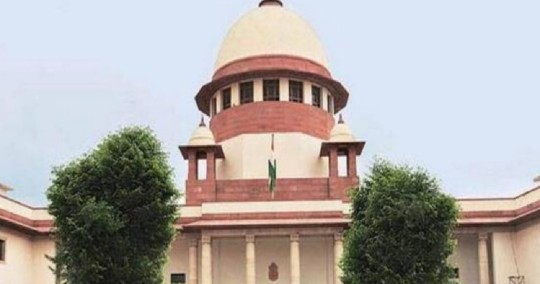
0 notes
Link
Ravi Kishan tied an orange safa (turban) around his head as his SUV stopped at a village named Domari No. 1. Kishan, the Bharatiya Janata Party (BJP) candidate from the city of Gorakhpur, is also called ‘Amitabh Bachchan of the East’, a superstar of Bhojpuri cinema in eastern Uttar Pradesh (UP) with 600 films to his name.
A woman from the village who saw his cavalcade stop could hardly believe her eyes--a star had actually stepped off the silver screen and stood right in front of her. She abandoned her egg stall, switched off the chulha (stove) and told her customers she was sorry she couldn’t serve them for now. She had to get a closer look at the movie-star.
Kishan’s candidature was unexpected and full of drama, just like his films. Here is his description of how he was offered the candidature: “I just got a call. The CM sir (chief minister of Uttar Pradesh, Yogi Adityanath) called me. He said ‘Are you ready to do service to society?’ I said, ‘Yes, I want to.’ He said, ‘You can.’ ”
Kishan’s story of his journey to Gorakhpur as a candidate was equally dramatic: “I have 11 films on the floor right now. I was shooting a Telugu film with Mr Bachchan and Chiranjeevi. And I got a call at 2 in the afternoon on April 14--that you have been finalised for Gorakhpur and you have to go. I didn’t go home. I called up my wife, called my children. I said, ‘Papa is going for service.’ They said, ‘What!’ I said, ‘Ya’. They love me so much so they said, 'Papa, sure. But win and come, don’t lose.’”
A year ago, the BJP had lost the Gorakhpur seat, an embarrassment for the party at multiple levels. First, it was a seat Yogi Adityanath had won five times in a row till he was made chief minister in 2017, leaving the seat free for re-election. Second, Gorakhpur is the city where Adityanath became a yogi, going from being Ajay Bisht to the mahant or head priest of the Gorakhnath peeth or temple trust. It has since been known as ‘the temple seat’.
Third, the seat was won in 2018 by someone from the opposition alliance--a young man called Pravin Nishad, the son of the founder of the NISHAD party formed only in 2016. It is a party whose name is an acronym but also the name of the founder’s caste, Nishad, one of the Other Backward Classes (OBC) in UP, and a broad grouping of various boatmen and fishermen communities.
The Nishads saw in the founder, Sanjay, an opportunity to be represented as a distinct political entity for the first time. The founder had written a book, Nishadon ka Itihas (the history of the Nishads), in which he redefined his community to include those who live across geography and time: The 15th century Italian explorer Christopher Columbus and the 16th century Portuguese explorer Vasco da Gama, for example.
Pravin Nishad, who won the Gorakhpur Lok Sabha by-election--represented until then by current Uttar Pradesh Chief Minister Yogi Adityanath
In bending history, time and folklore, Sanjay Nishad pulled off a jugaad or a sleight of hand typical to UP. It is also how he got around India’s electoral rules that prohibit the formation of caste-based parties. Sanjay simply converted his caste name into an acronym that stands for Nirbal Indian Shoshit Hamara Aam Dal.
Sanjay Nishad’s son, Pravin, was a decade and a half younger than Adityanath. He was 29 and fresh out of an engineering school but managed to tie up with the BJP’s rival party, the Samajwadi Party (SP). He defeated the BJP in the 2018 bye-election by a narrow margin of 21,881 votes.
Pravin Nishad, however, switched loyalties in March 2019, opting to align N. I. S. H. A. D with the BJP’s National Democratic Alliance (NDA).
Was the electorate’s 2018 verdict against Adityanath or against the BJP in general? What did the reversal in Gorakhpur mean? It is now Ravi Kishan’s task to find the reasons and fix them.
The challenge of winning Gorakhpur
Ravi Kishan stepped out of his SUV and waved at his fans. A man from his cavalcade pulled out a rustic speaker and turned up the volume of a Bhojpuri song as Kishan threw his voice out loud with a homage to the gods: “Har har Mahaaaaaadev!” “Jai Shri Raaaaaam!”
A young woman takes a selfie as Ravi Kishan, Bharatiya Janata Party candidate from Gorakhpur, addresses the crowd during his campaign. Kishan, also called ‘Amitabh Bachchan of the East’, has 600 films to his name and lost an election before--on a Congress ticket in 2014.
Kishan had lost an election before--on a Congress ticket in 2014. Bruised from that defeat, he admitted privately that it did not feel good to be cast aside after losing, so he switched parties. “After losing, not a single call I received from the Congress,” he said. “Just one call, like, ‘Hi, how are you, don’t worry, we are there.’ ”
Gorakhpur was one of India’s 250 most backward districts in a list drafted in 2007.
Just six months after Adityanath was sworn in as the chief minister, an incident had showed up the collapse of the state’s critical health infrastructure. In August 2017, at the state-run Baba Raghav Das (BRD) Medical College in Gorakhpur, 60 infants died because oxygen supply was stopped, allegedly because of unpaid bills.
Since then, the chief minister has had to battle voter perception that the state neglected basic healthcare. An AIIMS (All India Institute of Medical Sciences, which rank among the best government hospitals and research institutes in the country) was started in the city and its out-patient department has just about become operational. The BJP and Kishan have put this at the top of their list of the state’s achievements.
Cards listing achievements of the Bharatiya Janata Party government, particularly for Gorakhpur, are handed out at candidate Ravi Kishan’s meetings.
The state government also handed out statistics to the press claiming that infant deaths at the BRD Medical College showed a dramatic downturn the same month that the deaths occured: From an average of 18 deaths a day since 2014 it was actually down to less than one- third or 5.3 deaths a day by August 2017, the UP state health department claimed.
Electricity supply is another issue that is high on the BJP’s own list of achievements. The state government’s rural electrification programme, Saubhagya, claimed 100% coverage in the state. But in districts such as Gorakhpur, the area itself is on the power grid but individual households are not, as per a 2017 policy paper written for UP by the Council on Energy, Environment and Water, a think-tank. Most homes still use kerosene lamps, the study showed.
“For them the main barriers to adopting connections were the steep upfront cost, high recurring payments and unreliable supply of electricity,” the study said. Despite two-thirds of Gorakhpur being electrified, only 13% of the households are primary users.
Source: Council on Energy, Environment and Water study, 2017
Employment, security, demonetisation--issues agitating voters
Less than a kilometre from where Ravi Kishan was campaigning in Domari No. 1, as soon as his cavalcade passed, people gathered around the local dhaba over pyaaz pakoras (onion pakoras) and a salty chutney for a political debate. Development, or the lack of, was the main theme.
Prabhakar Kumar, a young and fiery dalit, seemed the angriest of all. He voted for the BJP in the last general election in 2014 but would not this year.
“Mujhe to yeh lag raha hai ki BJP paanch saal me fail hai (I feel the BJP has totally failed in these last five years),” he said. As piping hot snacks were passed around, people such as Prabhakar flayed Modi for having famously said that making pakoras must be counted as a source of employment.
“Agar desh ke pradhan mantri padhey likhey log se pakoda bichwane kahey to isse zyada sharm ki baat ho hi nahi sakti (If the prime minister of the country is asking educated people to sell pakoras then what could be more embarrassing),” said Kumar.
Prabhakar Kumar (right), a young and fiery dalit from Domari No. 1 village in Uttar Pradesh’s Gorakhpur, voted for the BJP in the last general election in 2014 but will not this year. “Mujhe to yeh lag raha hai ki BJP paanch saal me fail hai (I feel the BJP has totally failed in these last five years),” he says.
Chandrasekhar Paswan, a 42-year-old furniture maker, also from a Scheduled Caste (SC) like Kumar, spoke about unemployment in eastern UP and his perception that the government has done nothing about it. “Pakoda bechna hai to 27-28 saal padhane ki kya zarurat hai? (If they’re going to end up selling pakoras, why should we put our kids through 27-28 years of education?),” he asked. “Primary mein degree padhwa ke pakoda bichwa saktey hain (Primary school should have been enough).”
The conversation moved from pakoras to Pulwama where Central Reserve Police Force personnel were attacked by alleged Pakistani terrorists on February 14, 2019. The government had ordered retaliation through air strikes, and the Modi government and the BJP have been hard-selling this as the achievement of a “strong” government.
Ram Dulari Kannaujia, who retired recently as a laboratory assistant in the government health department, also from an SC, weighed in. “I read somewhere recently that a wise man challenged Modi to make an election speech for just two minutes without using the names of anyone from the Nehru family, Hindu religion or Hindu-ness, the building of the Ram temple at Ayodhya and the Pulwama attacks,” said Kannaujia. “He cannot do it.”
Residents of Domari No 1 village in Uttar Pradesh’s Gorakhpur discuss development, unemployment and security issues. While some believed the Bharatiya Janata Party (BJP) has “totally failed”, others are impressed by development and the focus on “securing our borders”.
At this point, Bakshish Ahmed Warsi, a 66-year old retired school teacher, out-shouted everyone in his loyalty to Modi and the BJP. “Modi aur Yogi ki sarkaar Hindustan ke andar agar hamara rashtra surakshit nahi hai, desh ki seemayein surakshit nahi hai, toh yeh mulk nahi surakshit hoga (If under Modi and Yogi’s government our borders are not secure then we are not safe),” he said. “Isiliye Modiji ne pehley Hindustan ki seemaon ko surakshit kiya hai (That’s why Modiji focused on securing our borders).”
Parshuram Sharma, an upper-caste farmer, was of the view that the BJP is a “syncretic party” that stands for inclusive development. “Hum bhajpa ko vote dete hain, hamarey vicharon mein pakshpaat aur jaat-paat ki ladai nahi hai--hamarey vicharon me vikaas ki ladai hai (I vote for the BJP and I don’t think that it is waging a battle of ideology or caste -- it is fighting for development).”
Parshuram Sharma, an upper-caste farmer from Domari No. 1 village in Uttar Pradesh’s Gorakhpur, says the BJP is a “syncretic party” that stands for inclusive development.
Kishori Lal, a farmer from the OBC group, brought up demonetisation, the invalidation of 86% of India’s currency (by value) in November 2016. “Notebandi se tamaam logon ko takleef hui thi (All people suffered because of demonetisation),” he said, adding that he was not a Modi fan.
What became apparent to us during the debate was that voters were not sticking to predictable positions. Some dalits who had voted the BJP last time were upset with the party this time around. Those from OBC groups, normally seen as BJP supporters, had turned critical of the party. And there was the odd Muslim BJP supporter. What was even more clear was that despite Gorakhpur’s economic backwardness and low literacy figures, the political discourse was peppered with examples from history, data and citations from the Constitution.
Rural Gorakhpur was angry and well-informed.
Brijen Prasad Nishad, an OBC, was upset with the new reservation policy Modi had proposed--10% for the economically deprived sections among the general category or forward castes. This would take away from the overall reservation quotas for backward and Scheduled Castes, he said.
The OBCs and SCs together make up more than 75% of UP’s population, so their support is crucial in any election.
Vijay Sahni, a farmer from an OBC caste, is upset with the BJP’s choice of candidate, Ravi Kishan. “Pichhli baar unko vote diya tha abh ki baar nahi diya jayega (I voted for the BJP last time but this time I won’t),” he said. “Pratyashi jo hain, yahan ke nahin hain. Isiliye sab log unko vote dene me sahmat nahi hain. Kalakaar aadmi hain, phir yahan par dikhai nahi denge (The candidate isn’t a local person. So people aren’t going to vote for him. He is an actor, we won’t ever see him here again.)”
At his meetings, Ravi Kishan did spend time tracing his roots to Gorakhpur--his family belonged to the district but migrated to Jaunpur and Varanasi. But perhaps Vijay Sahni had not heard him.
When rival turned ally
Pravin Nishad who wrested Gorakhpur from the BJP eventually joined the party in March 2019. But he is fighting from the neighbouring district of Sant Kabir Nagar, named after the 15th century Sufi and Bhakti poet.
His father, Sanjay Nishad, after fulminating against Modi and BJP president Amit Shah in earlier speeches, tied NISHAD to the NDA, as we mentioned earlier.
“People from my community are dying of hunger and the prime minister is busy touring abroad,” he had said in a speech delivered in July 2016 in Gorakhpur.
But why was not Pravin Nishad contesting from Gorakhpur which had voted him to power in 2014? No one in the BJP had a satisfactory answer but it set off a wide set of guesses. One was that there was infighting in the BJP and an attractive and popular outsider like Kishan could dissolve the tension. Another was that Adityanath did not want a powerful contender to a seat he saw as his home turf.
Pravin Nishad’s own response was this: “Ek nau jawaan ki zarurat kahin bhi mehsoos hoti hai to aap nisankoch, is bharat ko shaktishaali bananey ke liye hamara upyog kar saktey hain. If the need for a young candidate is felt anywhere, you (the BJP) can deploy me without hesitation to strengthen India,” he said.
At a stage erected in a large maidan in Khalilabad, the district headquarters of Sant Kabir Nagar, Pravin Nishad sat backstage waiting for the guest of honour to kick off his campaign–Amit Shah. Nishad sat on one sofa while another, covered with white towels, was reserved for Shah, no one else was permitted to sit on it--a special seat reserved for a guest by a party that is fighting upper-caste privilege.
Supporters of the Bharatiya Janata Party attend a campaign rally in Khalilabad, the headquarters of Sant Kabir Nagar district. Large speakers on the stage play popular qawwalis and songs remixed with BJP propaganda.
Large speakers on the stage played popular qawwalis and songs remixed with BJP propaganda. Music with an Islamic influence to entice an audience to Shah’s religiously polarised speech that followed. “Pakistani aatankvaad ke ghar me ghus-ghus ke maarenge (We will kill Pakistani terrorists in their homes),” Shah said. He added the customary jibes at opposition parties--the SP and the Congress, he alleged, will burst crackers with the Pakistanis. The final piece was about “infiltrators” in India who would be singled out and weeded out one by one (chun-chun ke). People in the party de-coded this to mean Muslim “infiltrators”.
“Hindu ghuspaith kaise ho saktey hain (How can Hindus possibly be infiltrators)?” asked a young BJP party worker in Gorakhpur.
‘We will support those who support us’
A young upper-caste participant at the rally, Angad Tiwari, looked uncomfortable with the profile of those around him. Amit Shah was canvassing for Pravin Nishad. And that, for Tiwari, was turning out to be a problem because it changed the caste profile of the party.
“I am a Brahmin and no one from my community is here,” said Tiwari. A group of young boys sitting at the back in red plastic chairs said they were actually SP supporters and were at the BJP rally for “time-pass”. Many were from the Nishad caste and were also at the rally for that reason.
Pravin Nishad’s supporters were confused with all the mixed-messaging but the young leader had his defence ready. “Dekhiye, ek naara diya hai hum logon ne (Look, we’ve coined a slogan for our party),” he said as a man in a grey safari suit with an automatic weapon waited in the wings. “Jo hamari hisseydaari dega, hum uske bhaagidaari denge. (Whoever gives us their support, gets our support).”
Gorakhpur and Sant Kabir Nagar are full of towns where shanties stick to one another, grey and dirty, with no drainage and often, no windows. And in their midst, shiny new malls rise, as if asking new aspirants to the middle class to claim their space or fight for it.
In Gorakhpur, right opposite the massive and sparkling white Gorakhnath temple with recreational boating for families, was a street that had nothing shiny about it. At a mango-seller’s cart, 55-year old Fayaz Siddiqui and another street-side vendor, Ramesh Sonkar, were arguing about what development meant to them. They were interrupted by a destitute woman in rags, named Gujarati.
“I have no husband, no home and no voting ID,” she said. “I tried to get one but I haven’t succeeded yet,” she added, imploring IndiaSpend to see how she lived, just one street away from the temple that brought fame to the chief minister as a holy man who gave food and alms to the poor.
Gujarati, a destitute woman, lives on the street right opposite the massive and sparkling white Gorakhnath temple--farthest possible from any sort of campaign. Or development.
Gujarati pointed to a large rubbish dump at the end of the road, propped up against a wall. There was no home there, no door, nothing. Just a section of broken wall against which she propped a bundle of clothes and a cot. She was the farthest possible from any sort of campaign. Or development.
In another corner of the city, Ravi Kishan repeated his refrain--that the Gorakhnath temple was “taking care of the people,” and Gorakhpur, devolving from that largesse, is a “BJP gadh” or stronghold. It was until a year ago.
(Revati Laul is an independent journalist and film-maker and the author of 'The Anatomy of Hate,’ published by Westland/Context in December 2018.)
We welcome feedback.
Please write to [email protected]. We reserve the right to edit responses for language and grammar.
Gorakhpur and Sant Kabir Nagar (Uttar Pradesh): Ravi Kishan tied an orange safa (turban) around his head as his SUV stopped at a village named Domari No. 1. Kishan, the Bharatiya Janata Party (BJP) candidate from the city of Gorakhpur, is also called ‘Amitabh Bachchan of the East’, a superstar of Bhojpuri cinema in eastern Uttar Pradesh (UP) with 600 films to his name.
A woman from the village who saw his cavalcade stop could hardly believe her eyes--a star had actually stepped off the silver screen and stood right in front of her. She abandoned her egg stall, switched off the chulha (stove) and told her customers she was sorry she couldn’t serve them for now. She had to get a closer look at the movie-star.
Kishan’s candidature was unexpected and full of drama, just like his films. Here is his description of how he was offered the candidature: “I just got a call. The CM sir (chief minister of Uttar Pradesh, Yogi Adityanath) called me. He said ‘Are you ready to do service to society?’ I said, ‘Yes, I want to.’ He said, ‘You can.’ ”
Kishan’s story of his journey to Gorakhpur as a candidate was equally dramatic: “I have 11 films on the floor right now. I was shooting a Telugu film with Mr Bachchan and Chiranjeevi. And I got a call at 2 in the afternoon on April 14--that you have been finalised for Gorakhpur and you have to go. I didn’t go home. I called up my wife, called my children. I said, ‘Papa is going for service.’ They said, ‘What!’ I said, ‘Ya’. They love me so much so they said, 'Papa, sure. But win and come, don’t lose.’”
A year ago, the BJP had lost the Gorakhpur seat, an embarrassment for the party at multiple levels. First, it was a seat Yogi Adityanath had won five times in a row till he was made chief minister in 2017, leaving the seat free for re-election. Second, Gorakhpur is the city where Adityanath became a yogi, going from being Ajay Bisht to the mahant or head priest of the Gorakhnath peeth or temple trust. It has since been known as ‘the temple seat’.
Third, the seat was won in 2018 by someone from the opposition alliance--a young man called Pravin Nishad, the son of the founder of the NISHAD party formed only in 2016. It is a party whose name is an acronym but also the name of the founder’s caste, Nishad, one of the Other Backward Classes (OBC) in UP, and a broad grouping of various boatmen and fishermen communities.
The Nishads saw in the founder, Sanjay, an opportunity to be represented as a distinct political entity for the first time. The founder had written a book, Nishadon ka Itihas (the history of the Nishads), in which he redefined his community to include those who live across geography and time: The 15th century Italian explorer Christopher Columbus and the 16th century Portuguese explorer Vasco da Gama, for example.
Pravin Nishad, who won the Gorakhpur Lok Sabha by-election--represented until then by current Uttar Pradesh Chief Minister Yogi Adityanath
In bending history, time and folklore, Sanjay Nishad pulled off a jugaad or a sleight of hand typical to UP. It is also how he got around India’s electoral rules that prohibit the formation of caste-based parties. Sanjay simply converted his caste name into an acronym that stands for Nirbal Indian Shoshit Hamara Aam Dal.
Sanjay Nishad’s son, Pravin, was a decade and a half younger than Adityanath. He was 29 and fresh out of an engineering school but managed to tie up with the BJP’s rival party, the Samajwadi Party (SP). He defeated the BJP in the 2018 bye-election by a narrow margin of 21,881 votes.
Pravin Nishad, however, switched loyalties in March 2019, opting to align N. I. S. H. A. D with the BJP’s National Democratic Alliance (NDA).
Was the electorate’s 2018 verdict against Adityanath or against the BJP in general? What did the reversal in Gorakhpur mean? It is now Ravi Kishan’s task to find the reasons and fix them.
The challenge of winning Gorakhpur
Ravi Kishan stepped out of his SUV and waved at his fans. A man from his cavalcade pulled out a rustic speaker and turned up the volume of a Bhojpuri song as Kishan threw his voice out loud with a homage to the gods: “Har har Mahaaaaaadev!” “Jai Shri Raaaaaam!”
A young woman takes a selfie as Ravi Kishan, Bharatiya Janata Party candidate from Gorakhpur, addresses the crowd during his campaign. Kishan, also called ‘Amitabh Bachchan of the East’, has 600 films to his name and lost an election before--on a Congress ticket in 2014.
Kishan had lost an election before--on a Congress ticket in 2014. Bruised from that defeat, he admitted privately that it did not feel good to be cast aside after losing, so he switched parties. “After losing, not a single call I received from the Congress,” he said. “Just one call, like, ‘Hi, how are you, don’t worry, we are there.’ ”
Gorakhpur was one of India’s 250 most backward districts in a list drafted in 2007.
Just six months after Adityanath was sworn in as the chief minister, an incident had showed up the collapse of the state’s critical health infrastructure. In August 2017, at the state-run Baba Raghav Das (BRD) Medical College in Gorakhpur, 60 infants died because oxygen supply was stopped, allegedly because of unpaid bills.
Since then, the chief minister has had to battle voter perception that the state neglected basic healthcare. An AIIMS (All India Institute of Medical Sciences, which rank among the best government hospitals and research institutes in the country) was started in the city and its out-patient department has just about become operational. The BJP and Kishan have put this at the top of their list of the state’s achievements.
Cards listing achievements of the Bharatiya Janata Party government, particularly for Gorakhpur, are handed out at candidate Ravi Kishan’s meetings.
The state government also handed out statistics to the press claiming that infant deaths at the BRD Medical College showed a dramatic downturn the same month that the deaths occured: From an average of 18 deaths a day since 2014 it was actually down to less than one- third or 5.3 deaths a day by August 2017, the UP state health department claimed.
Electricity supply is another issue that is high on the BJP’s own list of achievements. The state government’s rural electrification programme, Saubhagya, claimed 100% coverage in the state. But in districts such as Gorakhpur, the area itself is on the power grid but individual households are not, as per a 2017 policy paper written for UP by the Council on Energy, Environment and Water, a think-tank. Most homes still use kerosene lamps, the study showed.
“For them the main barriers to adopting connections were the steep upfront cost, high recurring payments and unreliable supply of electricity,” the study said. Despite two-thirds of Gorakhpur being electrified, only 13% of the households are primary users.
Source: Council on Energy, Environment and Water study, 2017
Employment, security, demonetisation--issues agitating voters
Less than a kilometre from where Ravi Kishan was campaigning in Domari No. 1, as soon as his cavalcade passed, people gathered around the local dhaba over pyaaz pakoras (onion pakoras) and a salty chutney for a political debate. Development, or the lack of, was the main theme.
Prabhakar Kumar, a young and fiery dalit, seemed the angriest of all. He voted for the BJP in the last general election in 2014 but would not this year.
“Mujhe to yeh lag raha hai ki BJP paanch saal me fail hai (I feel the BJP has totally failed in these last five years),” he said. As piping hot snacks were passed around, people such as Prabhakar flayed Modi for having famously said that making pakoras must be counted as a source of employment.
“Agar desh ke pradhan mantri padhey likhey log se pakoda bichwane kahey to isse zyada sharm ki baat ho hi nahi sakti (If the prime minister of the country is asking educated people to sell pakoras then what could be more embarrassing),” said Kumar.
Prabhakar Kumar (right), a young and fiery dalit from Domari No. 1 village in Uttar Pradesh’s Gorakhpur, voted for the BJP in the last general election in 2014 but will not this year. “Mujhe to yeh lag raha hai ki BJP paanch saal me fail hai (I feel the BJP has totally failed in these last five years),” he says.
Chandrasekhar Paswan, a 42-year-old furniture maker, also from a Scheduled Caste (SC) like Kumar, spoke about unemployment in eastern UP and his perception that the government has done nothing about it. “Pakoda bechna hai to 27-28 saal padhane ki kya zarurat hai? (If they’re going to end up selling pakoras, why should we put our kids through 27-28 years of education?),” he asked. “Primary mein degree padhwa ke pakoda bichwa saktey hain (Primary school should have been enough).”
The conversation moved from pakoras to Pulwama where Central Reserve Police Force personnel were attacked by alleged Pakistani terrorists on February 14, 2019. The government had ordered retaliation through air strikes, and the Modi government and the BJP have been hard-selling this as the achievement of a “strong” government.
Ram Dulari Kannaujia, who retired recently as a laboratory assistant in the government health department, also from an SC, weighed in. “I read somewhere recently that a wise man challenged Modi to make an election speech for just two minutes without using the names of anyone from the Nehru family, Hindu religion or Hindu-ness, the building of the Ram temple at Ayodhya and the Pulwama attacks,” said Kannaujia. “He cannot do it.”
Residents of Domari No 1 village in Uttar Pradesh’s Gorakhpur discuss development, unemployment and security issues. While some believed the Bharatiya Janata Party (BJP) has “totally failed”, others are impressed by development and the focus on “securing our borders”.
At this point, Bakshish Ahmed Warsi, a 66-year old retired school teacher, out-shouted everyone in his loyalty to Modi and the BJP. “Modi aur Yogi ki sarkaar Hindustan ke andar agar hamara rashtra surakshit nahi hai, desh ki seemayein surakshit nahi hai, toh yeh mulk nahi surakshit hoga (If under Modi and Yogi’s government our borders are not secure then we are not safe),” he said. “Isiliye Modiji ne pehley Hindustan ki seemaon ko surakshit kiya hai (That’s why Modiji focused on securing our borders).”
Parshuram Sharma, an upper-caste farmer, was of the view that the BJP is a “syncretic party” that stands for inclusive development. “Hum bhajpa ko vote dete hain, hamarey vicharon mein pakshpaat aur jaat-paat ki ladai nahi hai--hamarey vicharon me vikaas ki ladai hai (I vote for the BJP and I don’t think that it is waging a battle of ideology or caste -- it is fighting for development).”
Parshuram Sharma, an upper-caste farmer from Domari No. 1 village in Uttar Pradesh’s Gorakhpur, says the BJP is a “syncretic party” that stands for inclusive development.
Kishori Lal, a farmer from the OBC group, brought up demonetisation, the invalidation of 86% of India’s currency (by value) in November 2016. “Notebandi se tamaam logon ko takleef hui thi (All people suffered because of demonetisation),” he said, adding that he was not a Modi fan.
What became apparent to us during the debate was that voters were not sticking to predictable positions. Some dalits who had voted the BJP last time were upset with the party this time around. Those from OBC groups, normally seen as BJP supporters, had turned critical of the party. And there was the odd Muslim BJP supporter. What was even more clear was that despite Gorakhpur’s economic backwardness and low literacy figures, the political discourse was peppered with examples from history, data and citations from the Constitution.
Rural Gorakhpur was angry and well-informed.
Brijen Prasad Nishad, an OBC, was upset with the new reservation policy Modi had proposed--10% for the economically deprived sections among the general category or forward castes. This would take away from the overall reservation quotas for backward and Scheduled Castes, he said.
The OBCs and SCs together make up more than 75% of UP’s population, so their support is crucial in any election.
Vijay Sahni, a farmer from an OBC caste, is upset with the BJP’s choice of candidate, Ravi Kishan. “Pichhli baar unko vote diya tha abh ki baar nahi diya jayega (I voted for the BJP last time but this time I won’t),” he said. “Pratyashi jo hain, yahan ke nahin hain. Isiliye sab log unko vote dene me sahmat nahi hain. Kalakaar aadmi hain, phir yahan par dikhai nahi denge (The candidate isn’t a local person. So people aren’t going to vote for him. He is an actor, we won’t ever see him here again.)”
At his meetings, Ravi Kishan did spend time tracing his roots to Gorakhpur--his family belonged to the district but migrated to Jaunpur and Varanasi. But perhaps Vijay Sahni had not heard him.
When rival turned ally
Pravin Nishad who wrested Gorakhpur from the BJP eventually joined the party in March 2019. But he is fighting from the neighbouring district of Sant Kabir Nagar, named after the 15th century Sufi and Bhakti poet.
His father, Sanjay Nishad, after fulminating against Modi and BJP president Amit Shah in earlier speeches, tied NISHAD to the NDA, as we mentioned earlier.
“People from my community are dying of hunger and the prime minister is busy touring abroad,” he had said in a speech delivered in July 2016 in Gorakhpur.
But why was not Pravin Nishad contesting from Gorakhpur which had voted him to power in 2014? No one in the BJP had a satisfactory answer but it set off a wide set of guesses. One was that there was infighting in the BJP and an attractive and popular outsider like Kishan could dissolve the tension. Another was that Adityanath did not want a powerful contender to a seat he saw as his home turf.
Pravin Nishad’s own response was this: “Ek nau jawaan ki zarurat kahin bhi mehsoos hoti hai to aap nisankoch, is bharat ko shaktishaali bananey ke liye hamara upyog kar saktey hain. If the need for a young candidate is felt anywhere, you (the BJP) can deploy me without hesitation to strengthen India,” he said.
At a stage erected in a large maidan in Khalilabad, the district headquarters of Sant Kabir Nagar, Pravin Nishad sat backstage waiting for the guest of honour to kick off his campaign–Amit Shah. Nishad sat on one sofa while another, covered with white towels, was reserved for Shah, no one else was permitted to sit on it--a special seat reserved for a guest by a party that is fighting upper-caste privilege.
Supporters of the Bharatiya Janata Party attend a campaign rally in Khalilabad, the headquarters of Sant Kabir Nagar district. Large speakers on the stage play popular qawwalis and songs remixed with BJP propaganda.
Large speakers on the stage played popular qawwalis and songs remixed with BJP propaganda. Music with an Islamic influence to entice an audience to Shah’s religiously polarised speech that followed. “Pakistani aatankvaad ke ghar me ghus-ghus ke maarenge (We will kill Pakistani terrorists in their homes),” Shah said. He added the customary jibes at opposition parties--the SP and the Congress, he alleged, will burst crackers with the Pakistanis. The final piece was about “infiltrators” in India who would be singled out and weeded out one by one (chun-chun ke). People in the party de-coded this to mean Muslim “infiltrators”.
“Hindu ghuspaith kaise ho saktey hain (How can Hindus possibly be infiltrators)?” asked a young BJP party worker in Gorakhpur.
‘We will support those who support us’
A young upper-caste participant at the rally, Angad Tiwari, looked uncomfortable with the profile of those around him. Amit Shah was canvassing for Pravin Nishad. And that, for Tiwari, was turning out to be a problem because it changed the caste profile of the party.
“I am a Brahmin and no one from my community is here,” said Tiwari. A group of young boys sitting at the back in red plastic chairs said they were actually SP supporters and were at the BJP rally for “time-pass”. Many were from the Nishad caste and were also at the rally for that reason.
Pravin Nishad’s supporters were confused with all the mixed-messaging but the young leader had his defence ready. “Dekhiye, ek naara diya hai hum logon ne (Look, we’ve coined a slogan for our party),” he said as a man in a grey safari suit with an automatic weapon waited in the wings. “Jo hamari hisseydaari dega, hum uske bhaagidaari denge. (Whoever gives us their support, gets our support).”
Gorakhpur and Sant Kabir Nagar are full of towns where shanties stick to one another, grey and dirty, with no drainage and often, no windows. And in their midst, shiny new malls rise, as if asking new aspirants to the middle class to claim their space or fight for it.
In Gorakhpur, right opposite the massive and sparkling white Gorakhnath temple with recreational boating for families, was a street that had nothing shiny about it. At a mango-seller’s cart, 55-year old Fayaz Siddiqui and another street-side vendor, Ramesh Sonkar, were arguing about what development meant to them. They were interrupted by a destitute woman in rags, named Gujarati.
“I have no husband, no home and no voting ID,” she said. “I tried to get one but I haven’t succeeded yet,” she added, imploring IndiaSpend to see how she lived, just one street away from the temple that brought fame to the chief minister as a holy man who gave food and alms to the poor.
Gujarati, a destitute woman, lives on the street right opposite the massive and sparkling white Gorakhnath temple--farthest possible from any sort of campaign. Or development.
Gujarati pointed to a large rubbish dump at the end of the road, propped up against a wall. There was no home there, no door, nothing. Just a section of broken wall against which she propped a bundle of clothes and a cot. She was the farthest possible from any sort of campaign. Or development.
In another corner of the city, Ravi Kishan repeated his refrain--that the Gorakhnath temple was “taking care of the people,” and Gorakhpur, devolving from that largesse, is a “BJP gadh” or stronghold. It was until a year ago.
0 notes
Text
Gender quotas in India had unintended effects
Gender quotas in politics may have unintended consequences for other underrepresented groups, a study in India finds.
The study looked at India’s caste system and female representation in local government, where female-reserved seats have been enshrined in the 73rd and 74th Amendments of the Indian Constitution since the early 1990s.
“The effect of electoral quotas for women in India was to reduce the representation of lower caste groups,” says lead author Alexander Lee, an associate professor in the political science department at the University of Rochester, who looked specifically at what happened in Delhi in local elections once gender quotas were introduced. “In many poorer or developing countries electoral quotas can reduce the representation of marginalized groups.”
For their study, Lee and his coauthor, Varun Karekurve-Ramachandra, a PhD graduate student in the same department, examined the consequences of women quotas on the electoral representation of caste groups in local government bodies in Delhi. They found that constituencies reserved for women were less likely—compared to unreserved constituencies—to elect members of groups where the status of women was low.
In practice, this meant that those reserved constituencies were less likely to elect members of several traditionally underprivileged groups—especially of the so-called “Other Backward Class” or OBC castes—a collective term the Indian Government uses to classify educationally or socially disadvantaged castes. Instead, the scientists discovered, voters in women-reserved constituencies tended to elect candidates from the Hindu upper castes.
“In India if you have a policy that lets you choose only women, a disproportionate number of these women will be upper caste,” says Lee.
The author of From Hierarchy to Ethnicity: The Politics of Caste in Twentieth-Century India (Cambridge University Press, 2020), Lee is interested in the factors governing the success or failure of political institutions in South Asia and other areas of the developing world. In particular, his work focuses on the historical evolution of state capacity, the causes and consequences of identity politics, and bureaucratic politics.
The findings appear in the American Journal of Political Science.
Key findings about gender quotas
In countries where women have a higher social standing among elite groups, women quotas and/or rules to improve female representation will lead to increases in the representation of the elite and simultaneously lead to a reduction in the representation of people from historically marginalized groups.
When trying to increase the representation of one identity (such as female) through quotas—the representation of the second identity (such as social class, race, or religion) depends on the number of potential candidates who possess both traits.
If the number of candidates with both traits is disproportionately low, quotas will reduce the representation of the second identity even further.
A society’s attitudes toward gender are important when it comes to candidate pools: female candidates are less common among groups, societies, and in countries where the social involvement of women outside the home is discouraged.
So-called “proxy candidates” are especially common among marginalized (here lower caste groups) groups—women who are running for office in name only and are really stand-ins for their husbands.
When women quotas were introduced in India the proportion of proxy candidates (identifiable because they don’t give an occupation and have never paid income taxes in their lives, which means they have never worked outside their homes) increased.
In women-reserved constituencies in India the number of candidates decreased and fewer people ran for public office.
Among the small number of women in India who run for office a disproportionately large number come from the upper castes.
While the gender quotas imposed for local government elections in Delhi specifically achieved their narrow aim of upping the representation of women to just above 50%, the change had clear implications for caste groups. The proportion of winning candidates from castes with traditional gender norms (i.e., lower caste groups) decreased by 7.7 percentage points for a seat reserved for women. The team notes that the number may still understate the effect for active female politicians, because it counts also so-called proxy candidates. “Without the ability to run proxies, the effects would probably be larger,” says Lee.
In practice, this meant that the representation of members of the OBC category declined, while the numbers for members of the Hindu upper castes increased, in particular among the Brahmins and Banias.
“Gender quotas tend to politically strengthen groups at the top of traditional caste hierarchies and favor empowered groups over disempowered ones,” says Karekurve-Ramachandra. “These unintended consequences are plausible because we think that women from marginalized groups—at the intersection of two disadvantaged identities—tend be especially disadvantaged.”
The results highlight the difficulties of balancing descriptive representation on multiple, crosscutting dimensions, and the possible unintended consequences of the type of single-dimension quotas currently proposed for inclusion in the Indian constitution.
Does this apply to the US?
Not directly, say the researchers. In many rich countries the opposite actually holds true. For starters, the United States does not have legislative gender quotas, although the Democratic Party added language to its charter in 2018 that the party’s National Committee, the Executive Committee, and other similar bodies “shall be as equally divided as practicable according to gender” in an attempt to address the prevailing gender gap.
The researchers theorize that the effects of women quotas depend on the relative social standing of women in the pool of political candidates for the underrepresented group. In a situation with many qualified female candidates, Lee says, the quotas will raise the proportion of minorities in politics. However, if there are disproportionately low numbers of qualified female candidates in the minority pool, it’ll result in fewer minority politicians.
In the United States, for instance, the proportion of women among African American members the US House of Representatives is higher than the proportion of women among white House members. Also, the proportion of Muslim women in legislative bodies in many European countries is higher than that of Muslim men.
“Why this happens is debated a lot,” says Lee, who ascribes part of the effect to stereotyping. “If you have a minority that is seen by some as potentially threatening, women of that minority may be perceived as less threatening by members of the majority group and are therefore more likely to be elected.”
The relative status of women within minority groups may also play a central role when it comes to being perceived as a qualified candidate. Generally, the level of educational attainment among African American women is higher than among African American men for a variety of reasons, Lee notes.
The team believes that their findings in India can be generalized to a broad set of countries where the status of women is lower within underprivileged groups, including many developing nations. The exact effects, the researchers caution, depend on the exact natures of the imposed quotas, the role of partisanship, and social attitudes.
One thing, however, is clear: quotas for women can have consequences that go well beyond gender. And that effect, they caution, should be carefully considered in the design of any gender and ethnic electoral quota system.
The Charles E. Lanni Summer Research Fellowship funded part of the research for this study.
Source: University of Rochester
The post Gender quotas in India had unintended effects appeared first on Futurity.
Gender quotas in India had unintended effects published first on https://triviaqaweb.weebly.com/
0 notes